#it was because no matter all the economic resources it had it didn't have a church
Text
It's fascinating to me that for our modern (at least on European-influenced societies) thinking, the classical Roman way of life is so familiar. When you read about it, the rethoric of the speeches feels modern, a society based on contracts and laws and litigation, with public works, a state bureucracy and standing army and trade economy and even spectator sports, a concept of philosophy separated from religious dogma and tradition, with even a limited understanding of a government by 'the people' and 'citizenship', even the names all sound familiar even if in completely different contexts, and no wonder since they inspired our current politics.
This all in contrast to medieval feudalism, which is completely alien to me. A society created upon family connections and oaths of fealty and serfdom with no such thing as an overarching state, not even kingdoms were any more real than a title one person holds, and all held together completely, utterly, to an extent I cannot emphasize enough, by the institution of the Church and the Christian faith. In a way we just aren't used today in our secular world. I simply cannot overstate how everything, every single thing, was permeated by faith in the Medieval worldview and the Church which took its power from it, we have an understanding of it but I think people just don't realize it.
#cosas mias#this is a very silly example so bear with me#the other day I was watching some Manor Lords playthroughs#and a guy was complaining his medieval village wasn't growing#it was because no matter all the economic resources it had it didn't have a church#of course that for those people a place without a church is a non-place to start with never mind anything else#(and even the game oversimplifies that)#what I mean by these stupid tags is that we see religion as something private... for them it meant literally EVERYTHING#in a way we don't understand sure we can imagine a city without imagining churches... for someone on the middle ages#a Place was a Place where a Church was
995 notes
·
View notes
Text
realities, maximalism,and the need for big book™️
some gubat banwa design thoughts vomit: since the beginning of its development i've kind of been enraptured with trying to really go for "fiction-first" storytelling because PbtA games really are peak roleplaying for me, but as i wrote and realized that a lot of "fiction first" doesn't work without a proper sort of fictional foundation that everyone agrees on. this is good: this is why there are grounding principles, genre pillars, and other such things in many PbtA games--to guide that.
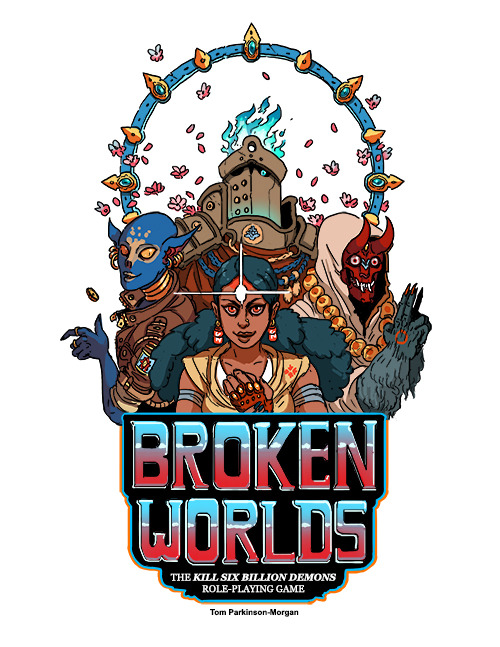
broken worlds is one of my favs bc of sheer vibes
Gubat Banwa didn't have much in that sense: sure, I use wuxia and xianxia as kind of guideposts, but they're not foundational, they're not pillars of the kind of fiction Gubat Banwa wants to raise up. there wasn't a lot in the sense of genre emulation or in the sense of grounding principles because so much of Gubat Banwa is built on stuff most TTRPG players haven't heard about. hell, it's stuff squirreled away in still being researched academic and anthropological circles, and thanks to the violence of colonialism, even fellow filipinos and seasians don't know about them
this is what brought me back to my ancient hyperfixations, the worlds of Exalted, Glorantha, Artesia, Fading Suns... all of them have these huge tomes of books that existed to put down this vast sprawling fantasy world, right? on top of that are the D&D campaign settings, the Dark Suns and the Eberrons. they were preoccupied in putting down setting, giving ways for people to interact with the world, and making the world alive as much as possible.
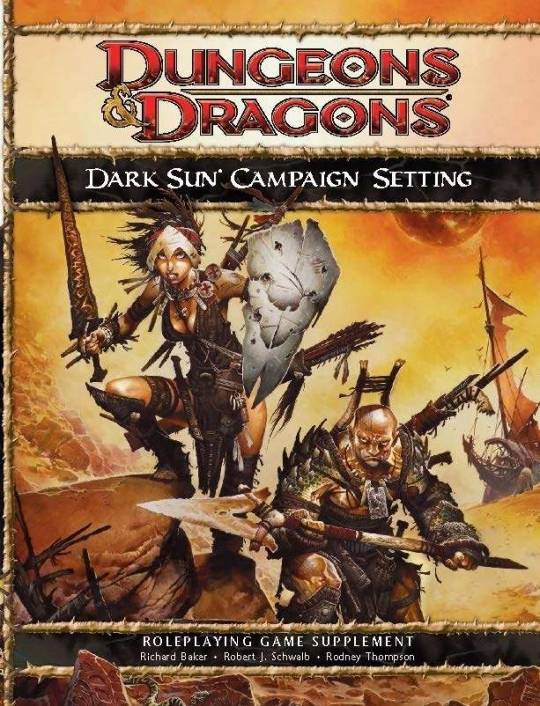
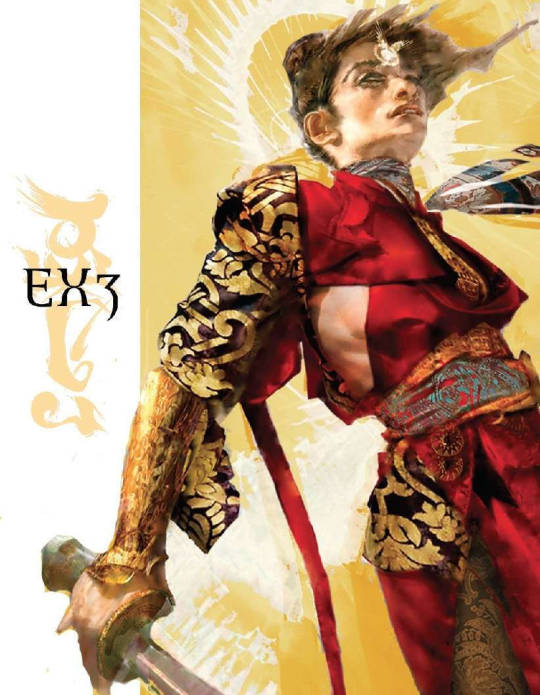
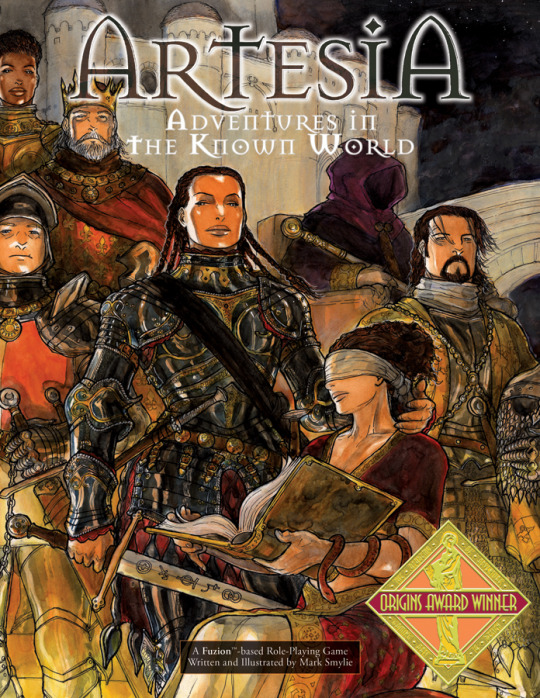
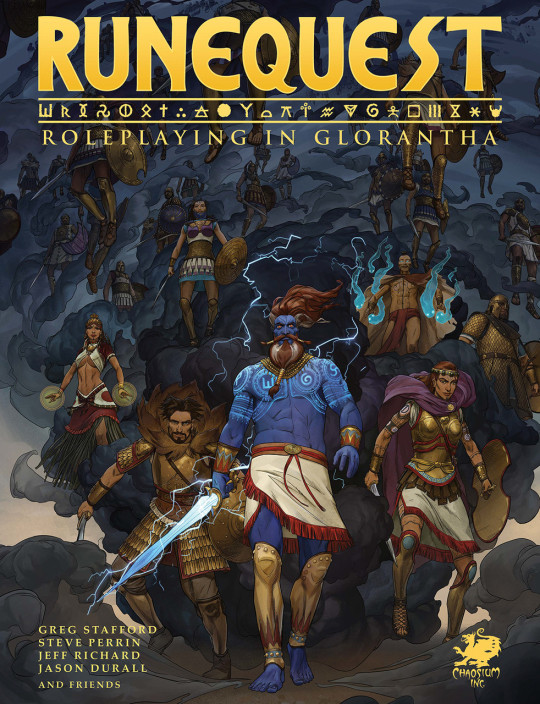

one of my main problems with gubat banwa was trying to convey this world that i've seen, glimpsed, dreamed of. this martial fantasy world of rajas and lakans, sailendras and tuns, satariyas and senapatis and panglimas and laksamanas and pandai... its a world that didn't really exist yet, and most references are steeped in either nationalism or lack of resources (slowly changing, now)

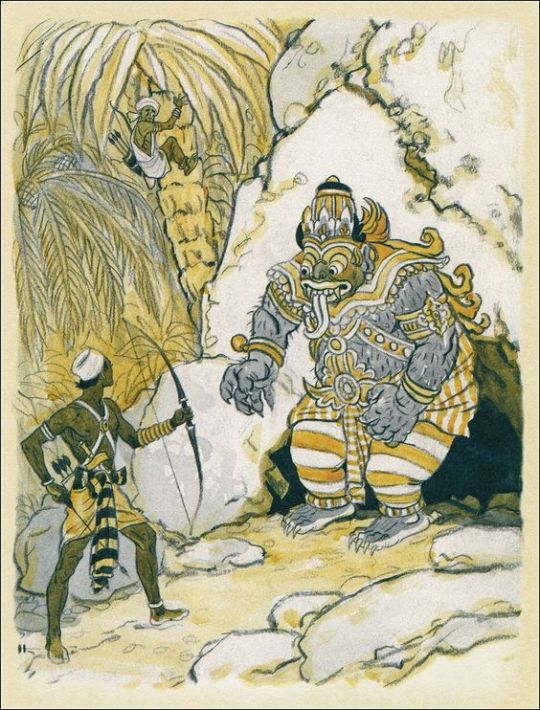

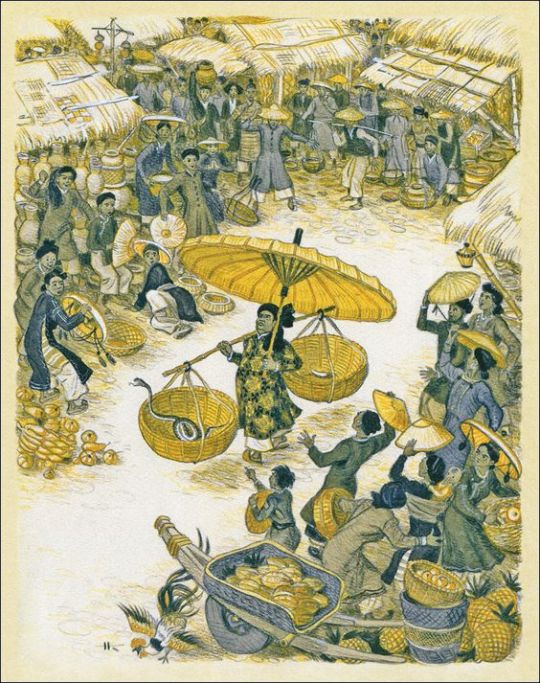
i didn't want to fall back into the whole gazeteer tourist kind of shit when it came to writing GB, but it necessitated that the primary guidelines of Gubat Banwa were set down. my approach to it was trying to instill every aspect of the text, from the systems to the fluff text to the way i wrote to the way things were phrased, with the essence of this world i'm trying to put forward. while i wrote GB mainly for me and fellow SEAsian people, economically my main market were those in the first world countries that could afford to buy the book. grokking the book was always going to be severely difficult for someone that didn't have similar cultures, or are uninterested in the complexities of human culture. thus why GB had to be a big book.
in contemporary indie ttrpg spaces (where I mostly float in, though i must admit i pay more attention to SEAsia spaces than the usual US spaces) the common opinion is that big books like Exalted 3e are old hat, or are somewhat inferior to games that can cram their text into short books. i used to be part of that camp--in capitalism, i never have enough time, after all. however, the books that do go big, that have no choice to go big, like Lancer RPG, Runequest, Mage, Exalted are usually the ones that have something really big it needs to tell you, and they might be able to perform the same amount of text-efficient bursting at the seams flavor writing but its still not enough.
thats what happened to GB, which I wanted to be, essentially, a PbtA+4e kind of experience, mechanically speaking. i very soon abandoned those titles when i delved deeper into research, incorporated actual 15th century divination tools in the mechanics, injected everything with Martial Arts flavor as we found our niche
all of this preamble to say that no matter how light i wanted to go with the game, i couldnt go too light or else people won't get it, or i might end up writing 1000 page long tome books explaining every detail of the setting so people get it right. this is why i went heavy on the vibes: its a ttrpg after all. its never gonna be finished.
i couldnt go too light because Gubat Banwa inherently exists on a different reality. think: to many 3 meals a day is the norm and the reality. you have to eat 3 meals a day to function properly. but this might just be a cultural norm of the majority culture, eventually co opted by capitalism to make it so that it can keep selling you things that are "breakfast food" or "dinner food" and whatnot. so its reality to some, while its not reality to others. of course, a lot of this reality-talk pertains mostly to social--there is often a singular shared physical reality we can usually experience*
Gubat Banwa has a different fabric of reality. it inherently has a different flow of things. water doesn't go down because of gravity, but because of the gods that make it move, for example. bad things happen to you because you weren't pious or you didn't do your rituals enough and now your whole community has to suffer. atoms aren't a thing in gb, thermodynamics isn't a real thing. the Laws of Gubat Banwa aren't these physical empirical things but these karmic consequent things
much of the fiction-first movement has a sort of "follow your common sense" mood to it. common sense (something also debatable among philosophers but i dont want to get into that) is mostly however tied to our physical and social realities. but GB is a fantasy world that inherently doesn't center those realities, it centers realities found in myth epics and folk tales and the margins of colonized "civilization", where lightnings can be summoned by oils and you will always get lost in the woods because you don't belong there.
so Gubat Banwa does almost triple duty: it must establish the world, it must establish the intended fiction that arises from that world, and then it must grant ways to enforce that fiction to retain immersion--these three are important to GB's game design because I believe that that game--if it is to not be a settler tourist bonanza--must force the player to contend with it and play with it within its own terms and its own rules. for SEAsians, there's not a lot of friction: we lived these terms and rules forever. don't whistle at night on a thursday, don't eat meat on Good Friday, clap your hands thrice after lighting an incense stick, don't make loud noise in the forests. we're born into that [social] reality
this is why fantasy is so important to me, it allows us to imagine a different reality. the reality (most of us) know right now (i say most of us because the reality in the provinces, the mountains, they're kinda different) is inherently informed by capitalist structures. many people that are angry at capitalist structures cannot fathom a world outside capitalist structures, there are even some leftists and communists that approach leftism and revolution through capitalism, which is inherently destructive (its what leads to reactionaries and liberalism after all). fantasy requires that you imagine something outside of right now. in essence read Ursula K Le Guin
i tweeted out recently that you could pretty easily play 15-16th century Luzon or Visayas with an OSR mechanic setting and William Henry Scott's BARANGAY: SIXTEENTH CENTURY PHILIPPINE CULTURE AND SOCIETY, and I think that's purely because barebones OSR mechanics stuff fits well with the raiding and adventuring that many did in 15-16th century Luzon/Visayas, but a lot of the mechanics wont be comign from OSR, but from Barangay, where you learn about the complicated marriage customs, the debt mechanics, the social classes and stratum...
so thats why GB needs to be a (relatively) big book, and why I can contend that some books need to be big as well--even if their mechanics are relatively easy and dont need more than that, the book, the game, might be trying to relay something even more, might be trying to convey something even more than that. artesia, for example, has its advancements inherently tied to its Tarot Cards, enforcing that the Arcana guides your destiny. runquest has its runes magic, mythras (which is kinda generic) has pretty specific kinds of magic systems that immediately inform the setting. this is why everything is informed by something (this is a common Buddhist principle, dependent arising). even the most generic D&D OSR game will have the trappings of the culture and norms of the one that wrote and worked on it. its written from their reality which might not necessarily be the one others experience. that's what lived experience is, after all
*live in the provinces for a while and you'll doubt this too!
385 notes
·
View notes
Text
Mel and Jinx, Co-Presidents of the Black Sheep Club
Isn't it crazy the way Jinx and Mel never interact but are practically foils to each other throughout the show? They both started out as black sheeps of their respective families for essentially the same reason, both excelled at different set of skills their families wouldn't or couldn't prioritize for their goals.


The traits that alienated both Mel and Jinx within their own families, and eventually had them torn away from them, also landed them in a place where their skills are valued. In Piltover, Mel becomes a master of court and the informal Head of Piltover’s council in a relatively short amount of time. With Silco’s resources, Jinx becomes one of Zaun's brightest and deadliest engineers and the best shot there is down there.
Ambessa, and Noxus in general, had no motivation to adopt Mel's perspective on diplomacy as it had the potential to weaken their family's standing. Vander wasn't equipped to handle or cultivate Jinx's skills in firearms or engineering nor was he in position where he could. Sure, Vander could support the other kids in their more manual pursuits, like boxing, lockpicking, and general physical strength building, but that's all he could do for Zaun in general. Vander as a leader was just maintaining Zaun in a way that didn't challenge Piltover's dominance, he couldn't support Jinx's skills because those were areas Piltover used to assert force over Zaun.

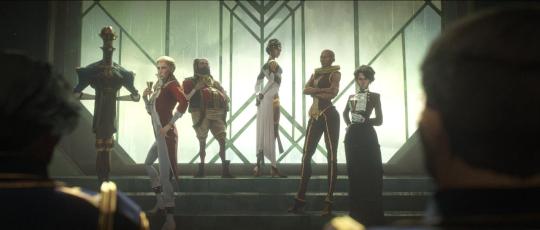
Jinx and Mel are both characters that are well acclimated to violence thanks to their mentors (Ambessa, Vander, and Silco) and environment, and are now effective actors of violences in their respective spheres. It's obvious with Jinx, she's a willing force within Silco’s empire. Jinx also runs around with grenades and guns and rockets killing enforcers and firelights alike. With Mel, she oversees an incredibly violent hierarchical system as the informal head of Piltover’s council that does cause on screen civilian casualties. Mel herself is also comfortable sending a militarized force into Zaun to shakedown the populace to assert the illusion of control. Even Mel's plans for hextech (outside of weaponizing it) were a form of economic violence to Zaun as it made Piltover less dependent on Zaunite labor, the one thing they could leverage.
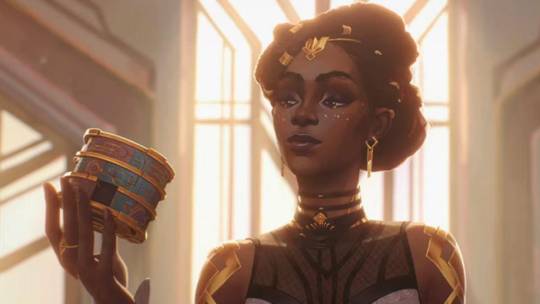
Where the two really diverge is how they handle power and conflict. From the beginning Mel enjoyed being the politician behind the current, never putting herself in full risk of fallout by hiding behind her choice of figurehead. This passivity that helps Mel avert risk extends throughout business and social life. Mel doesn't seek out Jayce on his hextech theory she stumbles upon him in when he's breaking into the Academy. When Mel's upset with Jayce she lets him come to her. When Mel misses out on new hextech investors she let's an opportunity present itself to let her make up for it rather than confront Jayce. Mel almost never actively attempts to be vulnerable in matters of business or of the heart.
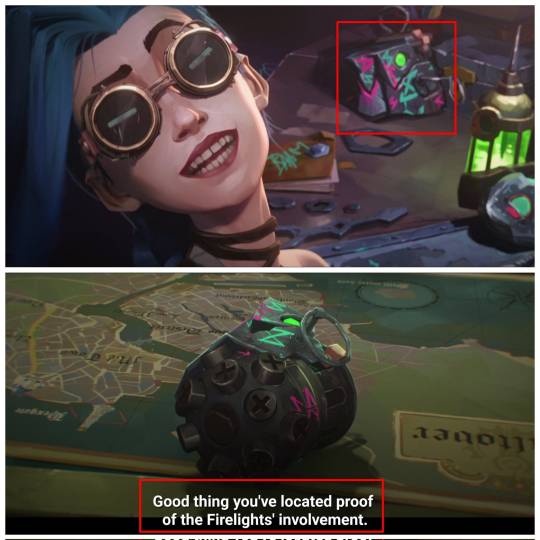
Jinx is quite literally the complete opposite. Jinx refuses to be passive throughout the show, when presented with a problem, especially one that makes her vulnerable, Jinx immediately decides she'll solve it her way. When Vi tells her she can't come to save Vander, Jinx goes anyway to use her experimental bombs. When the destroyed Shimmer shipment set Silco's operation back further widening the gap between PnZ, Jinx decides to steal the hexgem and frame the Firelights for it. After Silco tells Jinx that Marcus will crack soon, she kills him along with his closest men at the bridge, once again framing the Firelights for it. What use were those Enforcers if they were going to flip soon? Jinx doesn't wait to be self righteous, or for others to come to her. Jinx chose to confront her loved ones by kidnapping them and forced them to decide how they're relationship was going to be based on the choices Jinx gave them.
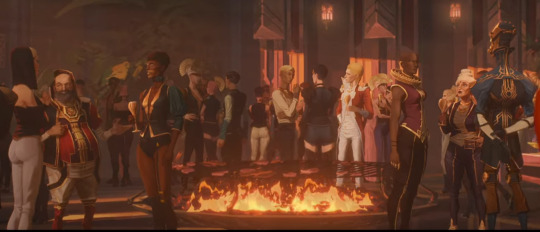

It's ironic how these two have never met, and yet they both work as one another's boogeyman. For Jinx, Mel practically is Piltover, this bright shining machine that unrepentantly tore apart her life. Mel is wholly uncaring of the fallout of her past decisions that led to conflict with Zaun and solidly remained transfixed by her "line goes up" style definition of progress the entire time until it came back to bite her. For Mel, Jinx is like the stuff of her nightmares, brutal and single-mindedly ruthless in her goals that she achieves through violent means. Mel gravitated more to the advisor role because she not only hated war, but feared the consequences of being at the mercy of people like her mother, people like Jinx.
Jinx and Mel have such potential when you explore both as foils of one another. I could go on and on about their light and dark motifs, how their respective hqs are placed at the very top and extreme bottom of their cities, or how Mel gets Jayce and Jinx gets Viktor in the hextech divorce, but I won't. It's better to wonder how they'll converge in the aftermath of the finale.
#arcane#jinx arcane#mel medarda#together these two make one good noxian#frankly theirvrelationship to their primary parent deserves its own post#arcane meta
78 notes
·
View notes
Text
Maybe this Will Put Things into Perspective about Rhaenyra & Cersei's Kids Being Bastards or Not...
Feudalism is an early period or a economic phase of a millennia-managed con against anyone who isn't a noble man, and most men are the active conmen.
Neither set of kids were ever declared bastards. Nor were they ever or "acknowledged" as bastards, because noblemen "acknowledge" a child they father onto another woman. noblewomen, in theory, can, but if their having had sex premaritally/extramaritally isn't already known outside of the household they do not. Because to do without it already being known (like with Alys Turnberry) would publicly ruin her prospects for marriage in the future, ruin her reputation, and likely muddy the family's as well.
Robert probably would have removed those kids from the line of succession had he known (and he didn't) if not outight remove them from the mortal coil. But instead, he got gutted. Therefore, Cersei's kids are not officially or "legally" bastards. That prior declaration is what is required to have them "legally" known as bastards.
Bastardry has always been more of a legal question in its nature than a biological fact of nature. Of course, we the audience and most of ther know that Rhaenyra's kids aren't Laenor's biologically; Ned correctly deduced that Cersei's weren't Robert's biologically. However, he was never able to get his information to matter "legally", or to get it to Robert to make a decision on. Whereas Laenor, Corlys, Viserys all knew and decided to maintain the boys as their heirs. And they made this decision based on the lack of knowledge the public has/what they can control. Which is often what any noble does; once again, GRRM has explicitly stated that the lords of Westeros often take advantage to twist "laws" (customs) according to the circumstances around them & their own desires, and it's is not exclusive to bastards already "acknowledged".
The purpose of marriage as an institution is entirely for the lord/nobleman's benefit. It is an institution that was created and developed entirely for a man's political interests (a father's, a brother's, a husband's, a son's, etc.). And it was made to consolidate/monopolize the noble woman's (or really any woman) body and reproductive labor so as to produce living products to pass on the resources/titles mainly the lord and his ancestors have aggregated. To try to make sure those resources are passed to the people the lord wants passed own to, the sexual purity culture imposed on women and girls works to construct shame & suppress female extramarital and premarital sexual activity, which is an aspect of her overall agency. Her agency is re-confined/socially reduced to her sexual activity because she has no other primary function nor legal privileges aside form being a wife, mother, daughter, virgin, etc. Or sometimes the protectoress of her husband's/son's assets: the castle at times of war/siege when the lord is not present; director of his household's activities and servants by being its head overseer of accounts. Therefore, the lord is literally claiming his wife as his effective property through her womb & this is often why when we see women like Daena sleeping with a man not her husband, it is an act of reinforcing her authority or political agency in spite of how she was raised to see her own body.
Think about it: why do we not have a world or society (fictional or not) where even though the wife births a child not her husband's the husband's do not willfully or are "legally" compelled to adopt that child as their own, effectively de-fathering the biological father? Because men want to feel as if they have as close to total ownership over female companionship and labor so they consolidate power to themselves and not to women. Having all these designations of gender and "bastardry" that everyone are compelled to follow makes that easier without expending energy or sharing power. Medieval customs put the social-legal identification of "bastard" from the institution of marriage, its compulsions on women, and their reproductive labor/bodies/uteruses being claimed by the men who are "licensed" to own them. Which is why when we say that neither Cersei's nor Rhaenyra's kids are "bastards" it is true, because the purpose of bastardry is to attempt to reclaim the product of reproductive labor and Viserys/Corlys/Laenor/Robert have already done that. To protest about how Robert didn't know about his kids not being his kids is really to protest how he didn't not get the products of Cersei's reproductive labor in the usual male-prioritized business of objectifying female labor that is intrinsic in this feudal society. Whereas Viserys/Laenor/Corlys accepted the products of Rhaenyra's reproductive labor.
All this is also why I really don't care for the impassioned argument of these women were being "unfair" to the system (Rhaenyra) or to their husbands, fathers etc. (Cersei) or them being "liars" or "destructive". Feudalism is itself an objectifying, unfair, unequal system. It is designed to benefit men and mainly men inherently, and directly at the expense of women who risk death itself while a man fathering any sort of kid never risks death. Men lie and destroy the women who birth their children, manage their household, protect their castle, rear their children....and it is all "licensed" and justified under the constructed institutions of marriage, oath-making, knighthood and principles of chastity, virginity, the different sub-meanings of "honor" for men vs women, etc. Men are themselves already objectifying or making an exclusive economic use of their female counterparts as well as going back on their vows (a deal that is still in feudal marriages, even for men) through their socially-allowed extramarital and premarital affairs producing bastards.
#westerosi bastards#cersei lannister#rhaenyra targaryen#the velaryon boys#the lannisters#the targaryens#westerosi feudalism#fedualism#asoiaf characterization#jacaerys velaryon#joffrey velaryon#lucerys velaryon#joffrey baratheon#tommen baratheon#myrcella baratheon#westerosi society
52 notes
·
View notes
Text
Classes in the Wizarding World. Why don't wizards have an "upper class" linked to wealth? And where do the wealth of the Malfoys and the Blacks come from, and how could wizards become rich?
Alright, this will be controversial, as there seems to be a widely accepted HC that wizards have exactly the same class divisions as Muggles, and I see a lot of metas where poor wizards are referred to as the "working class." I respect all opinions, but I want to express mine :) I disagree with this because the Wizarding world does not imply a replication of the Muggle social structure. The main argument about why there are no classes tied to wealth is that purebloods don’t have any exclusive access to means of production. The wizarding world isn’t like the muggle world, and their class structures are different. Magic fundamentally changes the entire structure of society.
In the muggle world, classes were primarily divided based on their access to wealth, economic resources, and means of production. If one part of society monopolises all the land, then you have classes of landlords and peasants. If one part of society owns factories and plants, holds stocks and capital, while another works at these factories, you have classes of capitalists and proletarians. Wizards don't have such classes. Strictly speaking, if we divide wizards into wealth-based "upper" and "lower" classes, we need to show where exactly the upper class has or ever had exclusive access to means of production that gave them the "privilege" to be called the "upper class". This is impossible to show because it doesn’t exist in the Wizarding world.
However, they do have a clear different way of dividing society.
But let's take it step by step.
In its time, the muggle upper class of the feudal society was too tied to "land" and the idea of land, which evolved into snobbery towards commerce and business because commerce allowed wealth beyond the nobility. This upper class felt their exceptional privilege. Their position was given to them at birth. But the emerging middle class... They were simply "mercantile" merchants. Many held beliefs in the superiority of feudal values and considered trade and business less honourable pursuits. Some nobles could also manage various enterprises related to agriculture, including mills, wineries, and sawmills. (Pure-blood wizards look much the same, but they don't have titles or lands, they have their blood. Your wealth doesn't matter if you're a pure-blood wizard. Take a look at the Black family tree. It's clear that not all of them were wealthy. I'm sure that many of these wizards had quite modest means. The Malfoys were an exception, but more on that later.)
When the English Revolution occurred, followed by the Industrial Revolution, and capitalists began to get very rich, while nobles unexpectedly started getting poorer, there was even stronger prejudice against "flaunting money," as it became associated with the newly wealthy lower class. Because true upper-class status isn't just about gold, and a capitalist will never have what they do – their family names and status given by God himself. Yes, among the nobles, there could also be entrepreneurs engaged in trade or investing in various projects, mining development, but the trend still leaned towards the impoverishment of aristocrats.
The Industrial Revolution happened after the imposition of the Statute, but the English Revolution came before. Obviously, wizards didn't have an industrial revolution. It's unclear how their production worked at all. Much of their production relied simply on craft workers. There are businesses like potion-making, Sleekeazy's Hair Potion production, broomstick manufacturing, although these "businesses" might look more like artisanal enterprises. Additionally, there's definitely a black market, but it's quite small. And let's not forget, in the world of Harry Potter, there's "slave labor."
Moreover, their main means of production is magic. And everyone has magic. Their production primarily requires knowledge and skills and doesn't require any significant physical infrastructure. Meanwhile, Hogwarts is free and accessible to all by birthright. Yes, access to raw materials may be limited, and these materials may indeed be owned by wealthy families, but for the most part, we don't see resources that are impossible to obtain independently. Another point is that students don't invent anything themselves over the seven years... Where's the theory of magic?! How to create spells?! Perhaps this needs to be self-taught.
Well, it's entirely obvious that they don't have peasants either, so there's no exclusive access to wealth for pure-bloods based on the feudal system either.
So, no classes based on wealth can exist for them simply because pure-bloods don't have any exclusive access to resources or means of production. A wizard born pureblood doesn't get anything at all for their blood, except connections.
Essentially, connections and blood itself are their exclusive resources, which they try to increase. Pure-bloods find it easier to get the right jobs, to get a job at the Ministry, and so on. Also Muggle-borns who became a part of the WW, presumably, could encounter difficulties getting hired or be paid less. But they could always start their own craft production of something. They had the main means of production – magic. But they lacked connections and social capital. Over time in the Wizarding World, Muggle-borns or half-bloods, judging from canon, could also get a job at the Ministry and even become Minister of Magic. Moreover, they created their own small craft-based enterprises or worked for other craftsmen and traders.
The Malfoys are likely those from former "Muggle aristocrats" who always kept a finger on the pulse and were well-connected in the Muggle world. They quickly figured out how to make even more money rather than just relying on income from land, although they also expanded their lands (they have managed to add to their lands in Wiltshire by annexing those of neighbouring Muggles). We know they keep a Rolls-Royce in their garage and have a collection of Muggle art (the favour they curried with royalty added Muggle treasures and works of art to an ever-expanding collection). It's not surprising if they invested in some muggle businesses. Essentially, the Malfoys are blood traitors, considering they had half-bloods in the family, but the family is too cunning and clever, so they maintain their position over the centuries. The Malfoys have always had a reputation as a slippery family, striving for power and wealth wherever they are.
The result is that they are one of the richest wizarding families in Britain, and it has been rumoured for many years (though never proven) that over the centuries the family has dabbled successfully in Muggle currency and assets.
Some other families were probably also Muggle aristocrats before the imposition of the Statute and owned some lands, but even if they still had these lands after the Statute was imposed, what good are these lands without peasants? Land doesn't monetise itself. The Statute assumes complete disappearance from the Muggle world, meaning these lands became invisible to Muggles and were either used for wizards and their internal agriculture or simply remained dead weight, as there is no demand for land in the WW as a resource. Considering magical means of production, cultivating land was very simple and efficient, so there were never any problems with food in the Wizarding world. And they didn't even need much land to provide all wizards with the agricultural products they needed. Additionally, house-elves could work on it. Furthermore, over time, many wizards owned their own gardens in different parts of the country and could grow food for themselves (for example, the Weasleys actually have their own farm, and Hogwarts definitely has pumpkins and poultry).
Moreover, strictly according to canon, food can be duplicated... Perhaps it's incredibly complex magic, so ordinary wizards can’t do it, but there are special wizard craftsmen who trade in duplicated food. Perhaps this food isn't as tasty.
Also, I headcanon that not all families agreed to hide precisely because they didn't want to lose their statuses and potential wealth.
The Malfoys also resisted to the imposition of the Statute, although they later denied it.
Historically, the Malfoys drew a sharp distinction between poor Muggles and those with wealth and authority. Until the imposition of the Statute of Secrecy in 1692, the Malfoy family was active within high-born Muggle circles, and it is said that their fervent opposition to the imposition of the Statute was due, in part, to the fact that they would have to withdraw from this enjoyable sphere of social life.
Likely, families like the Blacks and the Lestranges originally supported the imposition of the Statute.
Overall, the Malfoys' wealth was colossal; obviously, they were and remain the wealthiest in the WW. Perhaps the wealth of the Blacks and the Lestranges also persisted from the time when they were Muggle aristocrats. The Malfoys invested in the Muggle sector of the economy. The Blacks and the Lestranges might have invested their money in building Diagon Alley or income properties in Hogsmeade, or they could have been involved in the gray and black markets of the Wizarding World. They could also own magical mines, but it's unknown if this was allowed in the Wizarding world. Other families might have started some small businesses–broomsticks, wand production, potions, cauldrons, and so on. The Potters invented a potion and sold it and became "very rich." Well, suppose they exported their potion to other countries because they couldn't become "very rich" on the domestic market alone. The market is tiny. Or their "very great wealth" is greatly exaggerated.
We know that some pure-blood families pass down their trades from generation to generation, but that doesn't make them really wealthy. Still, they're considered noble. And the Gaunts are "noble" but very poor. Nobility can't be earned, but it can be lost quickly – like becoming a blood traitor. Take the Weasleys, for instance, who were considered noble even in the 1900s.
Families like the Umbridge have no connection to "nobility," but they really want it. They're desperate to belong: "I am related to the Selwyns... Indeed, there are few pure-blood families to whom I am not related. A pity... that the same cannot be said for you. 'Parents profession: greengrocers.'"
In a mockingly imitation of a Black: 'Typical half-blood. She doesn’t even understand our society!'
When a true Slytherin heir appears, even the Malfoys are willing to tone down their arrogance. The first Death Eaters followed Tom for this reason–he's the heir of Slytherin. It's a very high status among their society.
But the Malfoys' arrogance about money is probably because they had many connections with the Muggle world, the Muggle economy, and their personal views on money. They also continued to adopt the ways of Muggle capitalist society.
Sure, wizards wanted to get rich, but the wealth of individual families like the Lestranges, Blacks, and Malfoys wasn't class-based for the wizarding society. Firstly, a class of three families can't exist, and they don't have anything specifically exclusive that would set these three families apart in their access to wealth. What they possibly retained from pre-Statute life can't be the basis for forming a new class in the wizarding society. It just doesn't work like that.
Moreover, it seems that significant wealth could only be attained through innovations, as they also didn't have an internal investment market, financial instruments were absent, and Gringotts simply stored their gold. Okay, gold itself increased in value, but they constantly withdrew money for their living expenses, so capital must have been leaking out too. I suppose many families that were wealthy before the Statute quickly spent their large fortunes if they didn't adapt to the new conditions.
33 notes
·
View notes
Note
Wake me up when Targ antis who are so obsessed with them and their dragons have the same energy for the Andals, Rhoynar and First Men who did more of the actual colonizing than the Targs ever did even with all their dragons put together. (*cough* destruction of weirwood trees, Children Of The Forest *cough*).
Yes, the Targs had a major advantage in form of their dragons and the dragons, at the end of the day, were a resource not unlike men, ships, gold or weaponry that other houses possessed. Using this resource in wars and as a deterrent for enemies was not that different from what other members of the warring nobility did and would have done and it was fairly within the rules of the game. The first time when the dragons were used for inflicting wanton damage was during the Dance when Aemond torched the Riverlands. And the Dance was a conflict that occurred when one specific branch of the family that just happened to be influenced by Andals got too greedy and disregarded the lives of their kin.
The dragons,on their own, weren't malevolent creatures and weren't any different from other animals who would attack only when provoked. There were three dragons left alive at the end of the Dance: Cannibal, Silverwing and Sheepstealer. Unless GRRM reveals what became of them, it is safe to assume that those three remained somewhere in the realm without bothering anyone.
The Targaryen dynasty also ushered in a period of political stability and economic prosperity as compared to before when the kingdoms were all constantly at war with each other. They were also the ones who did some concrete work for the realm such as improving the infrastructure and introducing legal reforms like ending the right of first night and creating domestic violence laws. Aegon V was devoted to the smallfolk's welfare and could have initiated further reforms for them had it not been for the nobility - who didn't want the status quo to be disrupted - holding him back. That's another reason why the dragons were necessary. The bad apples of that dynasty were the exception and not the norm.
And to those who think Westeros would become a utopia if the Targaryens were to be removed, the realm went to shit in canon after their downfall and has been a shithole ever since even when they aren't involved with it.
“Aerys Targaryen left the treasury flowing with gold. How could you let this happen?”
-Ned Stark
This is Ned's reaction when he discovers in the Small Council meeting that the Crown is 6 million gold pieces in debt to several families and institutions.
There is also this little gem A Clash Of Kings:
She looked about to see that
no guards were near, and spat three
times. "There's for the Tullys and
there's for the Lannisters and there's
for the Starks."
"It's a sin and a shame," an old
man hissed. “When the old king was
still alive, he'd not have stood for
this."
"King Robert?" Arya asked, for-
getting herself.
"King Aerys, gods grace him," the
old man said, too loudly. A guard
came sauntering over to shut them
up. The old man lost both his teeth,
and there was no more talk that
night.
It is hilarious because Aerys was an objectively horrible person and one of the worst Targs but still, according to a member of the smallfolk himself, made a better king than the ones who came after him. There is also some degree of truth to it because Aerys went mentally unstable later in his life. But I guess the account of smallfolk matters not when it paints the Targs - for whom this fandom has a hate boner - in a positive light.
For the antis, when it is about other noble houses tearing the realm apart over their personal issues and conflicts, it is just fiction and fun. Wars are treated as normal occurrences because it's the medieval times and bloodshed and murder is supposed to be common. Who cares for the smallfolk when all that matters is watching the drama unfold in their favourite mid feudal house that they simp over? But the moment Targaryens are involved with their dragons, it becomes all about how all of them are mad and evil and how dragons and magic are bad. Everyone suddenly becomes an advocate for the rights of the smallfolk. Unless it's their favs tormenting the smallfolk of course.
Everyone needs to read this.
19 notes
·
View notes
Note
Why is that every Mayor of NYC, regardless of party, becomes some variety of a--hole? Are there examples of non-a--hole NYC mayors?
This seems a bit facile to me, and overlooks the nuances of a lot of NYC history. So let's look through the last fifty years of mayors and see whether it's actually true that they all become an asshole.

John Lindsay (1966-1973):
Like a lot of mayors in this period, Lindsay's main problem was NYC's long-term economic and demographic decline and the knock-on effects on the city's finances and resulting conflicts over public spending. To give him credit, while Lindsay did start the process of borrowing from Peter (the capital budget) to pay Paul (current expenses) and taking on debt to cover the hole in the capital budget, he also tried to deal with the problem by lobbying the state legislature to let him raise taxes and thus increase revenues.
That being said, the hate that Lindsay got as mayor, and he got a lot, didn't come from balanced-budget advocates. It came from white people in the outer boroughs who hated the fact that Lindsay tried to desegregate the city by pushing scatter-site public housing, that he backed a civilian complaint review board, and was otherwise viewed as being too sympathetic to black people, Latinos, and hippies.
Verdict: not an asshole. Fuck the haters.

Abe Beame (1974-1977):
The first (observant) Jewish mayor of NYC, Beame was a man tortured by the contradictions between his desire to maintain NYC's social democratic traditions and the awful economic situation he inherited. Beame became mayor during the 1973-1975 recession, which was at the time the worst since the Great Depression, and pretty much immediately had to deal with the NYC Fiscal Crisis, and was also mayor during the 1977 Blackout because clearly the Fates just fucking hated this guy.
If Lindsay was hated by white people for being too friendly with black people, Beame brought white people and black people together in their hatred of him for his public sector layoffs, his wage freezes, and his cuts to public spending. And while it's true that Beame absolutey adopted the logic of austerity and should be criticized for that, it should also be remembered that he was dealing with a well-organized and highly politicized capital strike that was backed up at the Federal level by the Ford Administration.
Verdict: kind of an asshole, but largely because he got mugged by Wall Street and the White House.

Ed Koch (1978-1989):
I think Ed Koch is the first person so far on this list that I'd call a genuine asshole (albeit a popular asshole for much of his career, hence his three terms). Starting with the fact that he got his start as a crusading left-wing politician in the Village and then abandoned his principles to run as a "law and order" candidate in the 1977 mayoral election, Koch had a long track record of running to the right whenever it benefited him personally, no matter who it hurt.
So what's on Koch's list? Well, we've got more budgetary austerity for working people while hiring thousands of more cops, starting the process of handing over the city to the developers, his opportunistic support for the death penalty, the massive corruption scandals in the Transportation and Parking departments, ettc.
However, I think the single biggest black mark on Koch's record is his abysmal handling of the AIDS crisis. Despite being a (closeted) member of the LGBT+ community, or perhaps because of it, Koch was both inactive and silent on the epidemic for years. Not only did the city spend almost no resources to deal with AIDS in the crucial early years, but a lot of ugly shit happened in NYC public hospitals that mayoral intervention could have put a stop to - but Koch did nothing.
There is a good reason why, if you talk to surviving ACT-UP members today about Ed Koch, they will spit at the mention of his name.
Verdict: asshole.

David Dinkins (1990-1993):
New York City's first black mayor, Dinkins reminds me a lot of John Lindsay, in the sense that his detractors were overwhelmingly motivated by racial animus refracted through the lens of policing. The fact that crime rates in NYC began to drop significantly during his tenure as mayor (well before Guiliani), or that he massively expanded the police force - none of that matters because he tried to make the Civilian Compliant Review Board legitimately civilian and independent of the NYPD.
That was enough to touch off a massive, and openly racist, police riot at City Hall, which Guiliani happily attended to stoke the flames of resentment against a black mayor who dared to tell the NYPD what to do.
Verdict: not an asshole. Fuck the haters.
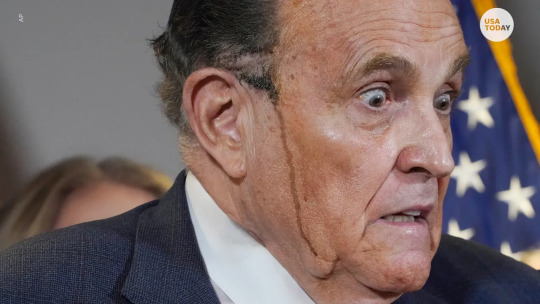
Rudy Guiliani (1994-2001):
In the wake of the 2020 election, a lot of columnists wrote breast-pounding op-eds, asking themselves what went wrong that America's Mayor had seemingly lost his mind in service to the Trump campaign.
As someone who grew up in Guiliani's New York, let me state with confidence: he was always a fascist loon, he just used to be better at it. Having ridden a wave of racist law-and-order politics to victory, Guiliani took personal credit for the decline in crime rates that was taking place nationally - to the point where he actually fired Bill Bratton for being more popular than him - and established the "Broken Windows" policy that would give rise to "Stop and Frisk."
Guiliani's alliance with the NYPD was based on the understanding that he would vocally take the NYPD's side in any police shooting or brutality case no matter how blatantly unjustified and depraved it might have been, whether that was the shootings of Amadou Diallo or Patrick Dorismond or Gidone Busch, the torture of Abner Louima, the racial profiling of the plainsclothes Street Crime Unit, and on and on.
And then there's the fact that, having made the frankly insane decision to place the Office of Emergency Management headquarters at the World Trade Center (this after the 1993 bombing), Guiliani took a frankly unwarranted level of press adulation at a time of national trauma and used it to try to illegally install himself as the unelected mayor of New York City.
Verdict: fascist asshole.

Michael Bloomberg (2002-2013):
More genteel and a better administrator than his predecessor, Bloomberg nevertheless pursued a raft of policies that were largely harmful to NYC. His housing and economic development strategies were designed to market NYC as a "luxury good" to the world's economic elite - seriously, read up on the history of the Hudson Yards development - to the detriment of affordability, beginning the process of gentrification that has left much of this city unaffordable to the majority of residents.
The main thing that makes Michael Bloomberg an asshole is his record on policing, where he doubled down on the "stop and frisk" strategies of Rudy Guiliani, going to the absolute wall in defense of them even when the courts began to knock them down as blatantly racially discriminatory. Then add to that his creation of a massive surveillance state aimed at NYC's Muslim population.
He routinely used his wealth to bribe would-be critics into silence, and then strong-armed the City Council into letting him run for a third term.
And there's the fact that he still owes me $200.
Verdict: plutocrat asshole. Where's my money, Michael? Where's my fucking money?

Bill De Blasio (2014-2021):
I've gone on record as saying that Bill De Blasio's first term was actually remarkable for progressive policy accomplishments, from establishing universal pre-K to raising the city's minimum wage to capping rents to ending stop-and-frisk, and so on and so forth.
That being said, there were two forces in New York politics that he was never able to deal with: the first was the rampant hostility of the NYPD (I was never much impressed by De Blasio's failure to stand up to the NYPD; say whatever else you will about David Dinkins, but he didn't mince words when thousands of drunk cops screaming the N-word invaded City Hall), and the second was the constant and malicious obstruction of supposedly Democratic Governor Andrew Cuomo on every single conceivable political and policy issue.
However, at some point very soon after his re-election in 2017, he just lost interest in being mayor of New York City. He still turned up for work, but even his political allies could tell that he had mentally checked out. If you're going to seek the job, you gotta do the job.
Verdict: not an asshole for four years, then an asshole for four years.
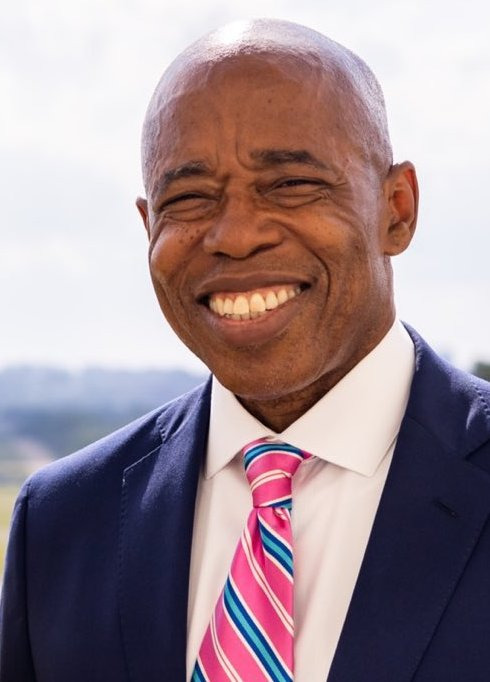
Eric Adams (2021-now):
Terrible on every conceivable aspect of public policy, but especially policing (because he's an ex-cop who ran on law-and-order politics and then found that didn't stop people carrying out random shootings) and housing (because he's an absentee slumlord who keeps getting fined for rats in his buildings).
Believes in crystal magic.
Verdict: asshole, possibly crazy?
129 notes
·
View notes
Text
BP Postmortem post 2 bc/image limit
Don't read this unless you've read the first one already! There's a 30-images-per-post limit and I had to split it up! Opening this readmore will immediately spoil lots of stuff and be confusing.
So, right. Nolan. Didn't that guy die? Case 1 killer?
Well, you see... that wasn't Nolan Cubbins. Not a very Brazilian name, was it? So... who's this kid?


That's Lucas Rossi, Davi's younger brother and host of "Bullet Proof", the fourth-most-popular Enoshima knockoff killing game on the air! (And the most popular one being broadcast in English!) While there's a whole production crew on the ground that edits together the footage, he's the host and director on-set.
Why's he doing this? Well... for the money, mainly.
Lucas met Junko Enoshima while she was doing a despair tour through Brazil. He'd been a student activist at the time, and student activists were sort of her favored prey, and what should have happened is that he was brainwashed like basically everyone else who ever met her. And that is what happened, until he went home to Davi and tried to spread the gospel of despair and Davi was like, what the fuck? And did some brain surgery to his little brother to erase the memory of meeting Junko.
After finding out what'd happened to him, and being deeply deeply discomfited by how malleable he turned out to be in the face of superpowered charisma, he developed a pretty intense hatred of her and the whole despair cult! He eventually connected with the Future Foundation, and found... that the Future Foundation was underfunded and needed more resources to put a stop to the apocalypse. They needed money. A lot of it.
So... Lucas got into showbiz. Despair-based entertainment was like, the only thing anyone cared about anymore, for some impossible reason, and lots of people had life savings they no longer cared about because life is pointless and only Despair matters, so... it was easy to play to the crowd. With Davi's help, he was able to put together some very convincing bloodsport and execution videos, but... the apocalypse is a tough environment for indie payment processors, so they had an audience, but not much money.
That's when the Bright Conglomerate reached out with a big budget and big plans to convert a flying Hope's Peak safehouse into a staged deathgame. They'd have top-of-the-line equipment, a whole production staff, and a major corporation working to adapt to the economic realities of the despair apocalypse and ensure cashflow. Lucas and Davi would get a cut of the revenue, and it'd be a lot of revenue- which he'd be able to divert to the Future Foundation in hopes of putting all this madness to rest.
So they flew up there and took over, thanks to Gwen and Sakura not bothering to turn on most of the ship's defenses, and Henry running interference. They initially tried to negotiate with Will Bookerton (still an adult at that point, trying to root out whoever had taken over Monokuma and started some sort of cockamamie Deception Game), and... faced opposition. Will didn't trust the tech, Henry wanted to cultivate more of a family-friendly image for the show which was insane and counter to the whole idea, and ultimately Lucas had Davi erase their memories so they couldn't interfere with production. It was all going to go perfectly!
And it went perfectly! A smash hit! Made billions! Bullet Proof was a reality TV craze that swept the, uh, anarcho-despairist perpetual riot that they had instead of a nation by that point.
Y'know, for the first couple seasons. Until season 3, when Lashauna shoved this dipshit off the top of the school building and his head got pulped on impact:

This was sort of a crisis point. Davi was forced to confront the reality that his skills couldn't undo every murder that happened on the show, and that the charade would have a cost in human lives. And a reality TV star dying in an accident during filming would be a huge scandal for a normal show!
But obviously this led to a huge jump in ratings with the show's core demo, so there was a bit of a moral dilemma there.
Lucas, in charge, ultimately decided... by the numbers, it was worth it. One fatal accident every so often, in exchange for funneling millions to stop the apocalypse where hundreds of thousands of people were dying every day? It... made sense, right? It was worth it. The show must go on.

Agnesi Wu Jessie Bai, until this point, was in the same boat as Raymond and Lilakali- a genuine Hope's Peak student who voluntarily assisted with the production of Bullet Proof. When she thought no one was really in any danger thanks to Davi's miracle resurrection tech, she was in league with Lucas to help fund the Future Foundation, and was happy to play the heel a bit to make the show more exciting. But, uh... once it became clear that people were actually dying, she wanted nothing more to do with it, and they started wiping her memory just like Henry and the rest. Still, there exists footage of her confessing to being the mastermind from earlier seasons, which was going to show up in case 5 as a misdirect.
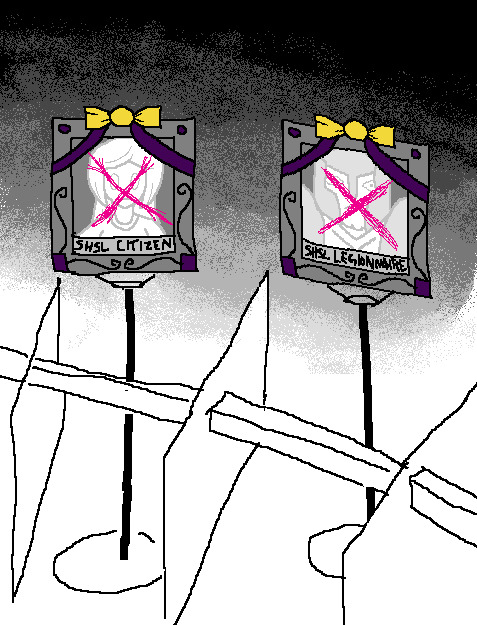

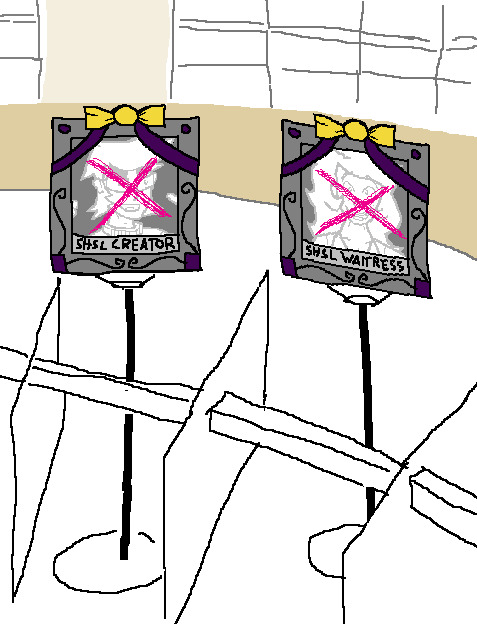
So people kept dying off. And they needed replacements for the dead students, so there'd be enough suspects, of course. So they imported some fake Ultimates.

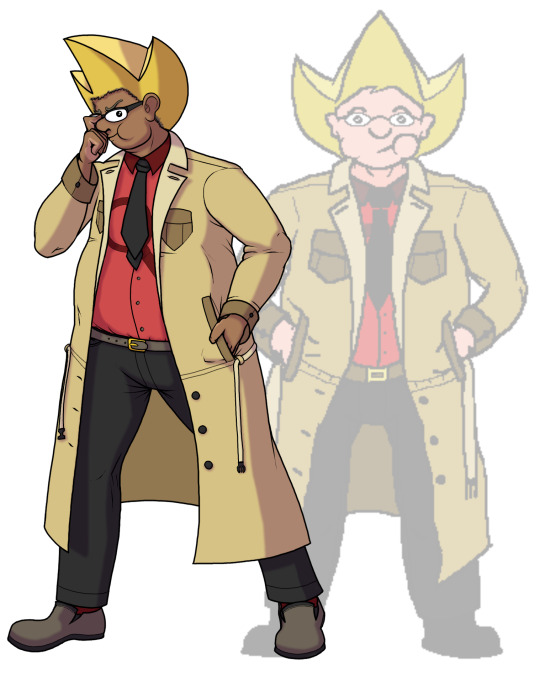
Martha and Vic were what they called "Murder Geniuses"- prolific killers who, after succumbing to despair, performed highly public and dramatic killings without suffering repercussions. Martha had formed an impromptu military unit that had dominated an entire city, and Vic was a prolific serial killer known as the Gumball Maniac. Bullet Proof's production crew managed to capture them, revert them to teenagers, and erase their memories of despair- adding some bigshot celebrities to the cast. I forget if I set this up in the adventure, but there was going to be another misdirect with the Hope's Peak student records, where their profiles would be missing- casting suspicion on them as mastermind candidates.
So... remember that one time I posted these, and was like "one of these is an actual evil mastermind design, hee hee hoo hoo"?
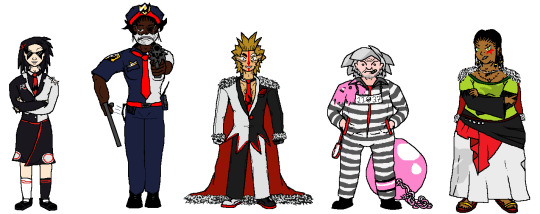
HAHA! GOTCHA! They were all actual evil mastermind designs! Kinda... bad ones, in retrospect, but whatever.
Anyway... it didn't take too long before the show caught the eye of Cyrus Bookerton, who was supposed to be headmaster of the school. He saw Billy on TV and was freaked out- deciding that it was worth opening up his safehouse and sending his daughter, ???? Bookerton, Ultimate Impostor, to rescue her older brother and put a stop to this.
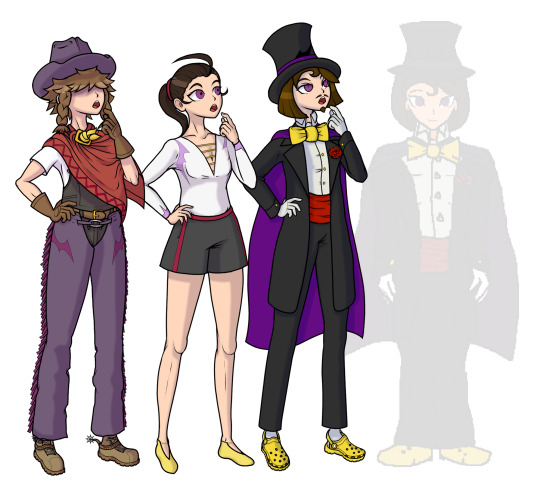
"Alice", in one of her earlier guises, posed as an intern at the production studio on the ground. As she was eager to get involved, she was eventually sent up to assist Lucas, Davi, Lilakali, and Raymond as a replacement student on the show.
She pretended Lucas was her hero, in her guise as an ascended fangirl working her dream job. He spilled everything to her, explaining how everything was to divert money to the Future Foundation and save the world. They were very close!
And as a result of them being very close, she noticed something. She noticed that Lucas had given up. Compromise after compromise made to keep the show on the air and the money coming in had worn him down, and he'd stopped really caring about where the money was going. Despair was beginning to get to him, the longer those Future Foundation millions went without saving the world. Nothing seemed to be changing, but all he could do was keep doing what he'd always done. He didn't really believe in what it was all for anymore. And... he'd gotten very good at doing his job.
So she went to go do what she was sent there to do. Kill Davi Rossi, put an end to Bullet Proof, and rescue her brother.
Only she got caught and failed.
She'd set up a bomb in the lab, but was caught red-handed and forcibly sedated and mindwiped. Because she'd been a double agent for so long, Davi had to do a pretty complicated mind-wipe, making swiss cheese of her memory so she'd only remember rehearsing her various cover identities. She was left only with the memory of being Alice Bayko, SHSL Stage Magician, normal student at Hope's Peak Academy. (Or Alistair Bayko, or Charlie Range, or Diana Ingenue, depending on what the player selected at the start of the game.) Demoted from showrunner/double agent to hapless cast member- with a suite of fuzzy and awkward half-remembered memories bleeding through.
After that... well, Lucas trusted her a lot. She helped run a bunch of seasons of the show, and her betrayal really got to him. In a fit of paranoia, he decided to become a shadow mastermind, operating from behind the scenes of behind the scenes, so that Raymond and Lilakali couldn't betray him too. No more mistakes like this one! Delete him from their memories, make them think it'd just been the two of them that whole time. Keep that Nolan Cubbins kid on ice- he'd take his place, and then...

...after posing as an easily-caught culprit in case 1, he'd get harpooned during his execution, and then... reeled back into the ship, where Davi would patch him up ahead of schedule. A perfect disappearing act.
As for Alice- getting mind-wiped wasn't an outcome she failed to anticipate.



It was always possible she'd get captured and mind-wiped. And if that happened, someone needed to finish the job. The state-of-the-art custom Monokuma droid she'd been set up with as part of her cover identity: Flopsy-Turvy. She'd programmed it with instructions to kill Davi and then self-destruct, destroying his lab and making it impossible for Bullet Proof to continue.
She didn't think to program it not to catch Billy in the blast, though, who happened to be infiltrating that very same lab via the secret passage he built in the first place.
I really hadn't figured out how I was going to present this whole setup to the players deductively, to be honest, but that's the upshot of Case 5: Determining that Flopsy-Turvy was the culprit, and by extension Alice.
And then Lucas, whose mental state at the time is best-represented by this TMBG song...
youtube
...executes Alice in a fit of rage and betrayal.
That's about as far as I had planned. I knew I wanted there to be some sort of case 6, getting into the backstory with Lucas and Henry and all the other backstory details that weren't explored in case 5, but I didn't have any clear plans- maybe some kind of action scene as Lucas's control over the guns and security systems goes up against the whole class working together to evade his defenses and subdue him, shot like an execution? And then an ending where the survivors take over the airship and fly off into the sunset with a vague intent to save the world somehow? Most of the dead would still be in Davi's tanks and hypothetically recoverable, if they found some other Ultimate Doctor. I didn't really have the ending nailed down from there, except that...
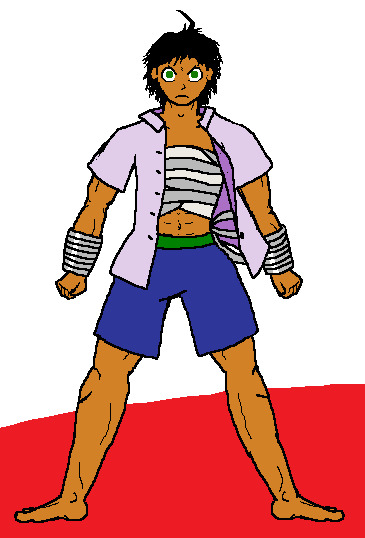
...with Alice dead, I was going to have Jo take off the incongruently feminine costume and reveal the ahoge, becoming the new protagonist. It's a rule of Danganronpa that the protagonist has to be a boy with a stupid hair doinker thingy! Joe Alejo, Ultimate Hope!
I was setting up a bunch of Gender stuff with Jo leading up to this protagonist reveal- when Davi's Monokuma was going to show up to treat the wound Martha suffered from Gwen's saw trap, he was going to notice Jo was binding with Ace bandages and be like. No. Honey. Come on. Here's my old binder from before I used my necromancer powers to trans my gender. That's so unsafe.
(Which... in retrospect, wouldn't have made sense? Surely this season isn't the first one in which Jo had a gender journey, and Davi who was responsible for reanimating them a bunch of times wouldn't have failed to notice this. Hrm. Would find a way to rewrite that moment in the reboot.)
That is... I think that's everything! Aside from... a few changes I was going to make in the reboot.
Reboot changes

One was going to be that... I was going to just cut Violette and Caleb. Violette's shtick was too annoying to write consistently, and Caleb was kind of me working through some religious baggage that I'm kinda distant from at this point.
To replace Violette as case 1's victim, I was going to build up to case 3's super tragic thing with Lashauna and Mill some more. To do this, I was going to split Dominique into two different characters.
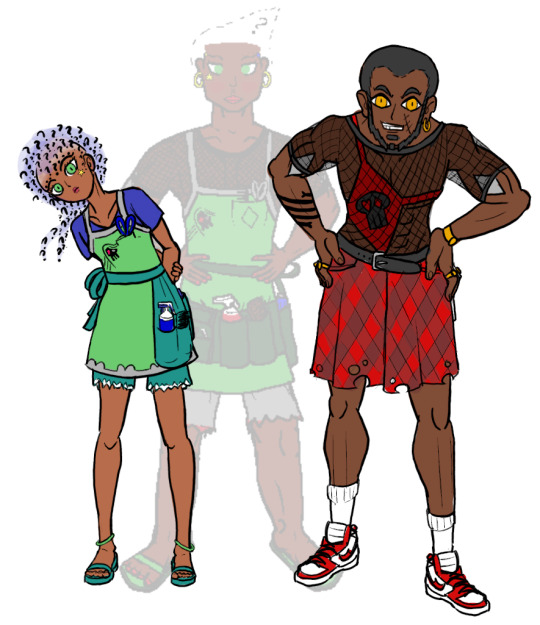
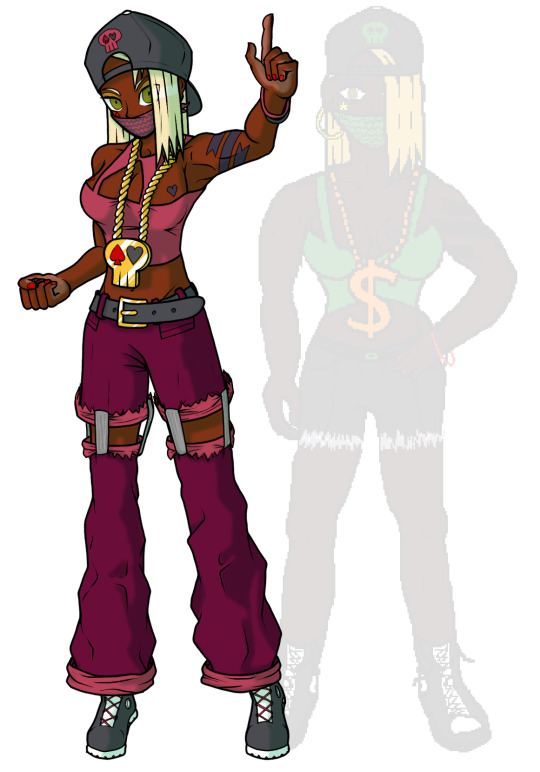
Dom had... a couple of weird things going on with him. The initial conception of his shtick was... completely cishet guy who acted all camp and flamboyant because he just liked messing with people. The kind of guy who's, like, absolutely homophobic, thinks queerness is deviant and disgusting- but thinks deviant and disgusting people are so funny to laugh at that he supports them anyway? Joins in on the bit? Like being gay is the funniest joke he can think of? A little extremely confused, and doesn't got the spirit at all, but somehow the same energy anyway?
Plus, like- Dominique was like, late twenties, absolutely not a real high-schooler, and Lashauna was... I want to say like, 18? Definitely too young for him, but also she's his boss so there was a weirdass power dynamic that definitely wasn't healthy in some direction or other- and it definitely wasn't a good look to have the camp gay guy be sort of a sexual predator.
That was always a really awkward bit to write, and I ended up not really committing to it at all. So instead he just sort of ended up... like, a normal stereotypical camp gay hairstylist guy? And then he died before there could really be any exploring any of the fucked-up parts of his character. It didn't really work.
So instead, we've now got Dominique Locke, Ultimate Stylist, and Nick Martin, Ultimate Gambler.
Dominique is just straight-up genderfluid, a shy and untalkative kid who uses their hairstyling and makeup skills to modulate their gender performance on a moment-to-moment basis. They get the hair-changes-every-portrait shtick, and get killed in case 1 only to come back alive in case 5.
Nick, meanwhile, gets most of the scummier elements. He's the homophobic one in charge of the Diamonds who colludes with Henry re:crime stuff and dies in case 2's double murder. This guy's very clearly not a teenager by any stretch of the imagination, and technically neither is Lashauna in this iteration, though I still want to have like, the too-young-but-also-his-boss fucked-up power dynamic for their weird relationship.
The idea there is to build up, like... one Hit Deck member dying in both cases before case 3, to build up to Lashauna and Mill's conflict re:whether she should cut her losses and kill him to escape or try and stick it out and save her last surviving subordinate.
-
The other thing I'd do is... foreshadow the reality TV and loops thing more. Introduce impossible footage of things that didn't happen earlier, find some way to explain the rules of memory modification ahead of time, and use the Monokumas as mouthpieces more liberally. Maybe have Davi show up in person only to disappear hastily at some point, so he doesn't come out of nowhere. There's a lot of this plot that just wasn't really sufficiently foreshadowed, I think, and with this many layers to it it would definitely be doable to start peeling them back earlier.
And, of course, rework the logic of the cases more to be, uh, better. More fair and solvable with multiple roads to noticing the relevant clues. The ones I did were very much a first attempt, and I didn't really have the knack for it yet.
And that's, uh... that's it! I think that's everything. If you've got any questions, ask box is open. Thanks to everyone who read and supported Bullet Proof while I was making it!
10 notes
·
View notes
Text
The Berlin Conference of 1884 is where most of the conquest of Africa starts:
If it seems like I keep repeating that as late as 1884 that 80% of Africa and almost all of Black Africa was not, in actual fact, occupied by Europeans there are very simple reasons for that. One of the first is the imagery shown at times that shows Europeans making their imperial wealth by looting Africa. Insofar as this was true it was the people sent on the hellbound ships to the Caribbean sugar colonies and to the US South and its Cotton Kingdom. The conquest was not about enhancing a wealth that already existed. The European marauders with Maxim Guns that marched into places rather familiar to the people who actually lived there and utterly unknown to them had no idea what resources, if any, were in these regions and as such couldn't have designed something for economics that they neither knew nor cared for what existed.
The Conquest was a measure of what was still, in this time, the fraying remnants of the old Concert of Europe and the refusal to allow quarrels outside of Europe to lead to wars within it, in one part. It was also the simple hubris of people who believed since 'whatever happens/we have got/the maxim gun and they have not' that it didn't matter what the locals think, it would be for the glory of Britain, Germany, Belgium, France, Spain, Portugal, and Italy that these territories would fall into their hands like overripe fruits.
To have had an actually planned intensive use of economic resources would have required Europeans to put the effort into learning what was actually there in Africa and how any of that worked. They did not, because they did not want to. This is not to absolve the conquests, it's to emphasize that the reality was actually more nihilistic and more reprehensible than the Hobson thesis plagiarized by Lenin would tell you.
Imperialism was not the highest stage of capitalism, it was 'we have machine guns, you have spears, obey or die' in a set of repetitive spasm of violence that brought European power, along with smaller enclaves of the US and Japan, to three quarters of the world. It was no planned set of elaborately masterminded exploitation schemes, it was failed second sons and queer people sent to go loot, butcher, and burn the Global South to get them away from shaming their families in the Metropole, as it was seen at the time, with later justifications giving it a rationale and a rational focus it did not, in truth, have at the time.
And if anything the truth of what happened is much worse than the comforting lies that there were purposes and reasons behind the horror.
#lightdancer comments on history#black history month#military history#berlin conference of 1884-5#imperialism#imperialism in africa#and again I will note that the absence of a plan makes things that much worse#entire states and cultures put to the sword because little Lord Dumbfuckeroy wanted to make his name#people just living their lives until some randos with Maxim guns started the butcher and burn and had no real clue why these people did thi
2 notes
·
View notes
Note
Yeah,I somehow could imagine that China in this story was trying to gather back these overseas Chinese.
Just a few days ago,I was having Chinese lesson in my school and there's a question that was related to motherland.And my teacher asked us where is our motherland,I say Malaysia.My teacher agreed that and she say,some people would think that China is our real motherland and that opinion was quite ridiculous.She also says that although Chinese Malaysian shares most the same culture and also language with China,but there's already a lots of differences between China and Chinese Malaysian.Of course,I was totally agree with my teacher.
My teacher even asked if we could like go to China,would we want to do that?And I said no,although Malaysia politic was no really stable and economy was way lower than China but it's still my home.
Ah,if China was trying to regain their population,would they change their law to let underage teenagers having "s-started-word" to give born more and more people?
Or would they even having some institution like the “Lebensborn e. V.” that the Nazis build to make more babies?
// Well, those people who said that certainly have quite the opinion don't they.?//
// I honestly believe that in this Au, it would happen, but it all depends on whether or not the hierarchy of the CCP(Communist Party Of China) will allow this to happen. I know as of recently in July, they have eradicated the "child limit policy", removing the limit of how many children a family could have. But since this is 2012, and China's population has had annual demographic growth even higher than the Soviet Union and Eastern bloc combined, don't expect the child limit law to disappear any time soon.//
// It is certainly debatable as to whether or not China would dedicate enough resources to even build such an institution in the first place. I would say not immediately, because for reason number one, holy shit. Reason number two is that given China's economic disparity in this timeline, they aren't really in the position to construct a facility given the present situation. Keep in mind, that only in the late 80s and 1990s did China improve relations with the Russians to the extent, that they began to develop similar reforms, and while these reforms were successful, they didn't automatically translate into success for them given the extent of damage the Cultural Revolution did to the Chinese mainland.//
//The only way I could see this being built is if the Soviets give them the funds to do it, but considering the fact of past memories during WW2 on the Eastern front, I don't believe they would even give them any support for building that since it brings back far too many horrific memories for many Russians.//
//Despite this, the overpopulation of Chinese citizens is certainly one of, if not the main long-term goals, for China in this Au, as they see this as their given right to massive expansion across Asia, no matter the cost. But that's going into spoiler territory, so I'll leave it here for now//
// What I am certain about is that no matter what happens, this story blog and its contents, are absolutely, 100% getting banned in China, without a doubt. A Tale Never Told is banned in China, let that sink in :)//
5 notes
·
View notes
Note
Oh yeh, I was reading through ur Curufin headcanons and I saw something about money laundering Himlad and how much his soldiers hated him- could you elaborate? This sounds so interesting. Did Celegorm know?
eeee thank you for asking me to talk more about these weirdos <33
okay, so i imagine the monetary system during the himlad era was primarily independent based on locale (so individual rulers of different areas were handling things like taxation and revenues), but every noldor-oriented kingdom was obligated to tithe to fingolfin (though he kept the amounts pretty low though), as well as giving him access to their records and accounts. maedhros took it as very much his responsibility to keep tabs on his brothers and make sure that they were rendering unto fingolfin and all. (fraud in noldorin society is highly stigmatized to the point of being nearly unheard of; it would be incredibly disgraceful for any leader to be seen as shirking their monetary duties to the community or being greedy, so maedhros's concerns about the ramifications of dishonesty aren't entirely unfounded.)
out of all the fëanorian realms, i absolutely think himlad was doing the worst. they had very little luck with farming--partially because of the land but mostly because neither celegorm nor curufin had really considered that they needed to, you know, actually build production structures to fund their war efforts--had almost nothing to trade with other kingdoms, and were constantly on the brink of economic collapse. what resources they had from valinor c&c mismanaged so badly in the early days that once they'd figured out the "gee, it'd be nice to have money" thing, it was too late to salvage them.
for curufin specifically, i think the better part of the himlad years were really personally challenging. it was his first time trying to lead without fëanor, and of course most of the people in his service had been passed along from dear old dad, so he had these absolutely massive shoes to fill. and additionally, he was locked in a perpetual who-can-micromanage-the-most battle with maedhros, who wanted desperately to step in and fix everything that celegorm and curufin had messed up and was constantly telling them so, very gently and kindly and condescendingly.
so obviously it became a matter of prestige. curufin, as a policy, would've rather been roasted slowly on a spit than ask maedhros or caranthir or, most dreaded of all, fingolfin to bail them out, and celegorm didn't get to have an opinion on money.
that was one source of support ruled out, and himlad was facing total government bankruptcy. what was left was either merging with another principality (absolutely not, given that that would amount to going crying back to maedhros and admitting that he was right all along), or criminality.
the choice was obvious, and curufin was never particularly scrupulous anyway, so it was mercifully easy too.
so first of all, fingolfin and maedhros were getting different account books. they were both equally falsified; eight out of ten transactions were completely fabricated and the ones that weren’t were so heavily doctored and modified that they bore little resemblance to reality. so right off the bat, all the tithes and taxes were wrong. the books shown to fingolfin presented a view of a struggling, un-prosperous realm, so naturally, their taxes were lighter. sometimes he let them off completely (fingolfin’s hope was always that eventually he’d be able to have a better relationship with c&c and tithing them into oblivion would be a rather rocky start).
the accounts presented to maedhros were normal, so that he wouldn’t suspect anything (he did suspect, but he was busy and stressed and look, sometimes you’ve got to pick your battles).
and curufin would find a million reasons to wiggle out of debts and deals or turn things around so that the other party was in the wrong legally and he could blackmail them (i don’t think he ever actually had an interest in law, but he got quite good by the end). he conducted a lot of trade and business through unsanctioned channels so that he wouldn’t have to record it and pay the proper taxes. celegorm, in his role as smugglers’ liaison and contact, handled most of the actual person-to-person interaction, since he was both more charismatic and more visually intimidating, and also because curufin Just Didn’t Want To (read: he was a paranoid lil stinky and was scared of being kidnapped).
as for curufin’s relationship with his soldiers, yep, most of them absolutely abhorred him to the point where talking about all the humiliating, horrible things they would do to him given the chance was a favorite himlad barracks activity. it became clear really from the get-go that he had all of fëanor’s worst qualities coupled with some of his own: where fëanor’s weaknesses had been seen as the eccentricities of a genius, curufin came off as just a haughty, harsh, perennially angry, immature coward with a spending problem and a whole forest of chips on his shoulder.
ironically, if he’d just been honest that he didn’t know what to do and was scared they’d reject him, they probably would’ve been totally on-board to help and support him but noooo it’s all asserting authority in the most damaging, violent ways possible. any perceived dissent was seen as a betrayal of fëanor’s mission, and was treated with a real zero-tolerance policy, along with any criticism of how curufin chose to run things, any positive feeling towards fingolfin or hints that they’d be better off with someone else in charge, any kind of insinuation at all, you get the picture.
inevitably, charismatic, jocular, handsome, understanding celegorm--who on his own would’ve been put through the wringer too, but compared to curufin seemed like a dreamboy--was sent in after to pick up the pieces and pull everyone back from the brink of revolt. he thought curufin was being too extreme, but he didn’t really speak up about it, partly because curufin would’ve lost it, and mostly because he liked having curufin in his debt and getting to play around with a reversed dynamic for a little bit (i’m sure you can imagine how much curufin loved that one).
so yeah, nobody escaped the himlad fuckery except maybe tyelpë, who lived in a private little cocoon of dubious familial bliss.
anyhow, thank you for reading all the way through this behemoth fshjfhsk
#brought to you by me#the professor’s world#frens#curufin#the silmarillion#celegorm#sad disaster boys#call and response
14 notes
·
View notes
Text
Caution: Psychotic Rambling Ahead!
I'm serious, this isn't funny or hot it's me being insane and experiencing an urge to inflict that insanity on others. It's less a story and more an idea I had while I should have been asleep and was compelled to record. This likely qualifies as eldritch knowledge since some of the ideas expressed within fundamentally altered my worldview when I first learned about them. It's not something that's going to make you recoil in disgust, but don't blame me if you start asking yourself questions and not liking the answers.
You're still here? Fine, don't say I didn't warn you.
500 words, estimated reading time: 3 minutes.
Schrödinger's cat is an often misunderstood thought experiment about quantum superpositions and dead cats. You are probably already familiar with the basic concept, but the point of the thought experiment is to expose a flaw in our understanding of physics. The cat cannot possibly be both alive and dead, therefore something must be wrong with our assumptions about how quantum physics works. No actual experiment occurred, it's a thought exercise meant to poke holes in a physics theory.
Another similar thought experiment which is likewise intended to demonstrate potentially flawed logic in economics and ethics is the Utility Monster. In economics, "utility" is a concept that sort of lumps together all the ways someone can benefit from something. If I have a good, like a dollar, or a doughnut, or a car that I don't want, it would theoretically be more ethical to give it to someone who would derive more utility from it than someone who would derive less. For example, a starving person would derive more utility from the doughnut than someone who just really likes doughnuts, who would in turn derive more utility than someone who is ambivalent towards them, who would derive more utility from it than someone who hates doughnuts and would just throw it out. This kind of thinking is broadly categorized as utilitarianism.
The Utility Monster is meant to expose a flaw in that thinking with a hypothetical creature that derives immense utility from destroying things. No matter how happy you would be to get a free car, the monster would be happier smashing it to bits than you could ever be over the entire lifespan of the car. The monster can derive the maximum possible utitlity from anything you give it. Thus, it would theoretically be more ethical to let the monster destroy the car than hand it over to someone who would actually use it. Indeed, the utility monster could justify taking pretty much anything based on this dynamic. This is, of course, absurd, but that's the point. It's meant to expose a flaw in utilitarian thinking.
Some of you might have already figured out where I'm going with this, and you get a gold star if you do, but for those of you who haven't, consider: Predators in vore scenarios are literal utility monsters. The pred is typically someone who receives rapturous, blissful pleasure from consuming prey. Reformation or not, if one were to abide strictly by utilitarianism, there are prey for whom it would be unethical not to sacrifice themselves to their nearest pred because the pred will, in those hours of digestion/endo, derive more utility than the prey would outside of their stomach. Even if we consider being in a stomach to be an economic "bad" (the opposite of a good, ie: something undesirable, that you would expend resources to avoid. Eg: paying protection money to the mob to avoid having your house torched.) We already accept that we may have to inconvenience others for a greater benefit, this scenario just turns the dials at both ends of the scale up to 11.
I'm glossing over a lot here, this is a tumblr post, not a 200 level econ course, and I'm not really sure what I'm trying to convey here, aside from insane philosophical rambling about anatomically impossible fetishes, but regardless, food for thought. Ba-dum tss.
2 notes
·
View notes
Note
27 for the history ask meme 📚
27. What’s your favourite historical “What if…” scenario?
Ohhh, 200% the what-if scenario if Britain doesn't successfully colonize India. There were several moments in the hundred and fifty years that the British East-India Trading Company slowly spread across India like a virus that the tides could have turned! For instance, although the first Anglo-Mughal war was a victory, the Mughal Emperor didn't respond by kicking the BEITC straight out of India for their fucking gall, which was an option on the table and one many of his courtiers advocated for! I wonder what would have happened if that had happened, because I imagine that without India's raw resources to cull, the British Empire would have had a much harder time with colonizing Africa through sheer weight of economic pull.
There were also several early rebellions against the BEITC's reign of terror, before the one everybody knows in 1857. I'm thinking specifically of the Paika Rebellion, because of its sheer size and organization compared to the other rebellions, which could have seriously crippled the BEITC. I always wonder what could have happened if one of the biggest rebellions against colonial world orders had succeeded early.
I imagine they might have attempts to cripple India with debt and other such things, as they did to Haiti, when Toussaint Louverture and his army overthrew the French and Spanish in Haiti and successfully freed his island from slavery, but I imagine that with allies like Haiti against the colonial struggle, we might have had a more viable organized resistance to colonialism before socialism develops, which would have been intriguing!
Another what-if scenario is I wonder about sometimes if what might have happened with the Ming Dynasty if the Hongwu Emperor hadn't been quite as a paranoid as he was. The Hongwu Emperor was a peasant who was so charismatic and powerful that he essentially managed to take control of the religious peasant rebellions happening all over the country and promote himself to being Emperor with remarkable ease. He was an incredibly intelligent and smart man and he was INCREDIBLY paranoid about being overthrown by his family, and so he essentially imposed a whole bunch of rules that reduced the power of the imperial family (they weren't allowed positions in court or local governments before becoming Emperor) and reduced the power of the central bureaucratic figures like the ministers to make sure they couldn't overthrow him. The system worked remarkably well when he was alive, because he was comically competent in everything he put his hand to, but the Ming Dynasty Emperors were essentially fucked from that point on. They had no actual grounding in political theory and had had no space to learn before becoming Emperor, so they essentially became glorified puppets for the much more politically experienced eunuchs--who the literati court despised.
The Ming Dynasty was kind of a success DESPITE everything happening in the capital because of the success of competent local governors, and the rise of revolutionary agricultural methods that literally meant no matter how many wars and mismanagement occurred, the population just kept going up anyway. You also have the rise of traders and artists and tourism in the Ming Dynasty in very cool ways, you have a very bustling middle-class population that aren't literati doing well for themselves despite everything. I've always wondered how glorious the Ming Dynasty might have been if their government hadn't been in shambles because of the way that the Hongwu Emperor designed it. What sorts of heights they could have reached.
#meme thingies#thanks so much for asking! i am a huge nerd#and i find myself fascinated by GRAND what-if scenarios
4 notes
·
View notes
Text
Hm
A strange thought occurred.
Lets assume that society miraculously can't use trains and cargo ships to move great deals of stuff from afar, which means centralized manufacturing facilities have less bang for their buck and you tend to rely on more local industry to build and sell things.
Lets assume that this society that has a premium for transportation of massive amounts of goods has access to our technology and processes to manufacture things on a small scale, just, for whatever reason, can't utilize cheap and bulk transportation of goods across the country or internationally. It's a ludicrous stipulation, but work with me here. Think small town colonial America times. The technology that you have isn't especially great save for major urban places where they make shoes and cotton clothing en masse.
If they knew all the science, physics and engineering that we do today, but applied themselves towards manufacturing a kind of light source and battery, I wonder what it would've been like? Yes, the answer is likely a multitude of standards, but..
Follow me. When we think of one to two centuries ago, we think of candle power and oil lanterns as the Old Timey way they lit their world. How they operated economically during those times that the sun was down. And why did they use that?
Because they were locally producable and available on a shoestring budget. When you live in a forest, you learn to work with wood. When you live in a rocky area, you learn to make stone into everything. The small businesses, or larger businesses, that turn labor into manufactured goods by turning cheap materials into goods and labor saving devices or services.
Some of the staples of today that we take for granted and tie the country together, are simply because geographic locations and mass transportation of goods by rail or ship makes it very efficient to have things spread all over the place.
But, what sort of standards and technology might we use if we didn't have that international access and had to rely more on regional businesses to provide? What kinds of technology, if it were purely ecologically regionally sourced and local, would we have?
The question of exactly what expectations we would have if our technology was limited to those choices based on the best technology and availability of resources to make them, and labor to produce them that we have, fascinates me. Might we have gone further up the tech tree for zinc or iron air batteries sooner?
Would we have some sort of old timey Solar Panel company in place of a parafin wax company? Something that could be created with a minimum of industrial machinery or big, expensive machines. What is the maximum level of sophistication that a single human being with handheld tools or power tools could create?
We think of old timey technology and kind of pity how almost-there our ancestors lived in the absence of science and technology and the society to sustain it. We went from wooden torches, to oil lanterns, to candles, to gas torches, to incandescent lighting, to LEDs. We went from drums, smoke signals, carrier pigeons, to telegram and radio in the matter of 1,000 years. And our predecessors would've used this technology, if they understood the physical processes and science and applied it to technology through what materials and industry they had available to them at the time.
I don't have any allusions of locally made being superior to things made in large businesses. That's stupid. But I am fascinated in scenarios where alternate technology standards develop out of ecological necessity, based on the available resources of the region and the infrastructures and companies that form to properly exploit them.
Just. Clearly, obviously, LEDs are superior to your typical incandescent flashlight or light source for their superior light, light quality, longevity, and potentially even the ease at which you can acquire the resources to make them if you needed to, easing the load of how quickly batteries are consumed. And if our old timey ancestors could've made those instead of the products they made, maybe they would have made those instead. Hindsight is 20-20, though.
This stream of consciousness probably sounds like veering word salad at this point, but bear with me.
What would the highest, most sophisticated kind of technology be that could also fill that niche and role of the chandler/candlemaker of yore? Where some dude could buy a few materials from the company that employs miners and sells minerals and metals or ores and make their own products, the way a candle maker acquires parafin and string to make candles?
It's an interesting question and criteria I really should explore more and try to refine, but I'm limited by my own ignorance of material science, engineering and regional ecology. But, it's an interesting set of thoughts to contemplate.
0 notes
Text
Object Relations: Fear Of Success Pt. 7-4
For Lighthizer, there has to be trade negotiations that think of trade balance and mutual advantages so that there isn't a carte blanche situation. If results on the ground show unfair trade practices, like dumping, currency manipulation, or a lack of access, there has to be a reassessment of any trade deal. "All the great economies were built behind a wall of protection and often with government money. The British industrial revolution was aided by a wall of tariffs. Likewise, the late-nineteenth-century explosion of American industry was the product of protectionism and often subsidies. Can anyone imagine the great American railroads being built without the grant of free land per mile? Similarly, the manufacturing countries of Japan, Germany, and now China all benefited during their development from tariffs, other barriers, and subsidies of one kind or another. It is important to remember that no country became great by consuming. They became great by producing...Our trade deficit grew by a factor of fourteen, while our GDP grew by a factor of four. The win-win situation promised by advocates of free trade has never materialized...It is not my position that all trade deficits are harmful. Clearly, if a country runs a deficit one year and a surplus the next, no harm is done. The surplus will offset the deficit, and all is good. Likewise, for one country to run a bilateral trade deficit with a second country and a surplus with a third is fine. They offset each other. Indeed, all three countries could benefit by increasing efficiency and maximizing the allocation of resources among them. What concerns me is running huge trade deficits with the entire world year after year for decades...The second exception to the principle that bilateral deficits don’t matter is that running up gigantic trade deficits with one’s geopolitical adversary is particularly stupid. In our case, the United States ships hundreds of billions of dollars’ worth of our wealth to China every year. This helps them build up their economy, build up their military, and have leverage over the political situation in the United States. It makes them more powerful in the eyes of all world leaders. I’m not sure there’s an example in world history in which two rivals—indeed, some would say enemies—have had such a lopsided economic relationship. It is fair to say China is challenging us because we gave them the money to do it. Clearly, during the Cold War with the Soviet Union, we never transferred such money. Had we done so, we might have lost to them...Tariffs don’t necessarily prompt trade wars, and removing tariffs often does little to prevent actual war."
There is also "...negative compounding. The people in the foreign country who buy our assets own those assets forever, with the obvious effect that they get the profit from those assets year after year. That profit compounds, and the effects of even one year’s trade deficit multiply over time as profits continue. Added to this is the fact that we have seen huge $500 billion to $1 trillion trade deficits year after year, so we have both an accumulation of trade deficits and a compounding negative multiplier on each trade deficit." Theory then assumed that it would still balance out because "...if a country that ran large trade deficits for a few years [they] would find less demand for their currency and their currency’s value would drop. This would then make it very difficult for that country to import and easy for it to export in terms of its domestic currency. Therefore, the weak currency would help correct the trade imbalance. Indeed, we see this occurring regularly around the world." Lighthizer then found that this didn't work for the U.S. because of the currency's demand in the world as a reserve currency, and the devaluation that other trade partners had done with their currencies. With a threat of a new BRICS (Brazil, Russia, India, China, South Africa) currency with developing countries dropping the dollar, there would then be a reduction of demand for the U.S. dollar, but this may be a long way off. According to Reuters "the [U.S.] dollar still dominates global trade. It is on one side of almost 90% of global forex transactions, according to Bank of International Settlements Data." The danger would be the mounting U.S. debt because you need people to buy your debt and if there's a sell off, there may not be enough buyers to avoid the U.S. government from having to print excess money to buy back the investments. The increased inflation would be damaging to U.S. dollar purchasing power, even if domestic manufacturing could restart from the high import cost environment.
Economist Sounds Alarm on US Dollar Losing Reserve Currency Status: https://news.bitcoin.com/economist-sounds-alarm-on-us-dollar-losing-reserve-currency-status/
The Path To Hyperinflation with EJ Antoni - TFTC: https://rumble.com/v3r7vlp-456-the-path-to-hyperinflation-with-ej-antoni.html
A lot of these unfair trade practices were also ignored for fear of stoking a trade war. "Trade liberalization came to be seen not just as a tool of economic policy but also as a path to perpetual peace." Lighthizer's book does come after COVID19, but the origin of the pandemic has yet to be investigated with enough thoroughness to prove that it was a lab accident only. Many people still feel intuitively that the release of COVID19 was intentional and a form of escalation in response to Trump's tariffs on China. It certainly doesn't help that China declared a People's War in 2019 before the pandemic. Chinese state media said that, "the Chinese side is fighting back to protect its legitimate interests. The trade war in the US is the creation of one person and one administration, but it affects that country’s entire population...In China, the entire country and all its people are being threatened. For us, this is a real 'people’s war.'" In the Strong Country blog one poster said "[The U.S. is] sucking the blood of the Chinese..." Another comment on the site said, "Why are Chinese people bullied? Because our hearts are too soft!" This would be an argument for peace advocates in the United States to allow mercantilism to continue in China, but Lighthizer would counter that not all wars are stopped by liberal trade policies. "Economic ties between the North and the South did not prevent the Civil War...It would be hard to argue that the rise of Germany as a major exporter in the late nineteenth century helped pacify that country in the first half of the twentieth. Japan’s dependence on raw materials from the United States motivated its attack on Pearl Harbor...China’s accession to the WTO in 2001—which was supposed to make the country a model global citizen—was followed by massive investments in its military capabilities and territorial expansion in the South China Sea. And certainly the great trade between Ukraine and Russia did not stop Putin’s invasion in 2022." Deep down, military situations are more accurately predicted based on the weakness of a target. The easier it is to attack a target, the more enticing it is to do so, like in the pattern of scapegoating described above. Attacking a strong target means that one has to assess casualties and ponder what a loss would look like to one's own sovereignty. A deterrence. Initial attacks are usually on weak targets or on military that are unprepared for the kind of attack planned. Even further, the new slave wage system became a draw down on wages for all world markets so sooner or later the same system would knock on every door and demand entry into all countries.
Chinese state media calls for ‘people’s war’ as US trade conflict escalates: https://nypost.com/2019/05/14/chinese-state-media-calls-for-peoples-war-as-us-trade-conflict-escalates/
China declares a ‘people’s war’ after Trump’s latest tariff hikes: https://thechinaproject.com/2019/05/15/china-declares-a-peoples-war-after-trumps-latest-tariff-hikes/
Chinese scientists discover EIGHT never-before-seen viruses... and now they plan to experiment with them: https://www.dailymail.co.uk/health/article-12665249/Chinas-discovered-EIGHT-never-seen-viruses-plan-experiment-them.html
REP. ROSENDALE REACTS TO REPORTS THAT WUHAN LAB SHIPPED CORONAVIRUS TO FAUCI-RUN LAB IN HAMILTON PRIOR TO PANDEMIC: https://rosendale.house.gov/news/documentsingle.aspx?DocumentID=691
Increasingly, there have been complaints from populist political commentators worldwide, and a shift between the typical left and right has created strange alliances where now it has become a political a divide between oligarchs and the workers who feel exploited by them. Ex-democrats like Donald Trump, Kari Lake, and Steven Bannon are now in the Republican camp. Big business leaders and big government Marxists have now allied on the side of China and want a continuing of the current mercantilist policies. Populists compare the China One Belt One Road initiative to that of being not a partner with China but a colony with a negative trade balance to match. Part of being a colony means importing the empire politics which then influences local politicians. The original expectation after the fall of the Soviet Union was the countries like China would reform into a representative government like in the west, but in the end it went in the opposite direction.
'Let Me Finish!' Johnny Rotten Makes His Views on Donald Trump Heard | Good Morning Britain: https://www.youtube.com/watch?v=v1uOwz_UrQ0
China Girl - David Bowie: https://youtu.be/imSPZt77sKo?si=GqTBSUfKxb5HlCIt
When the money goes from the exporters to the importers, it takes a foreign turn. Your home is where the money is and with globalism, the borders vanish, and as reported above, national values related to constitutions, and human rights are disregarded if the mercantilist country doesn't cherish them. It's just about naked money and power. The O'Keefe Media Group (OMG), for example, got an inside scoop on the giant investment group BlackRock and it became clear the view that people have when they have this much concentrated power.
"All of these financial institutions, they buy politicians."
"How do they run the world?"
"You acquire stuff. You diversify, you acquire, you keep acquiring. You spend whatever you make in acquiring more and at a certain point your risk level is super low...You own a little bit of everything and that little bit everything gives you so much money on a yearly basis, that you can take this big fuck-ton of money, and then you can start to buy people...We have a system in place. First there's the senators. These guys are fucking cheap. You got ten grand? You can buy a senator. It doesn't matter who wins. They're in my pocket at this point."
"Does everybody do that? Does BlackRock do that?"
"Everybody does that."
OMG Blackrock exposé: https://rumble.com/v2vg7ie-blackrock.html
More exposés from Steve Bannon showed the power of lobbyists in the same vein as the HR guy above described during the recent fight for a new GOP speaker. Typically in a representative government it matters who wins and different parties provide a check and balance to each other, but if there's an angle to win personally at the expense of a country then the balance begins to vanish. While watching politics for some time recently since the 2020 election, a certain narcissistic tactic was starting to appear again and again that I recognized by terms like "love bombing" which is a euphemism for the Trojan Horse. Like in the ancient Greek story, it's all about using niceties to bring down the defenses of an enemy and then you attack them at a weak spot. This is used everywhere and there's a long list in politics that never ends. In this context of corrupt politicians it works like this: The politician tells an electorate that wants reform whatever it wants to hear. Then when they are in power they look to lobbyists for directions in order to get more financial rewards. Typically, this leads to retribution at the polls when the politician is grilled on their bad voting record and primaried by another candidate from the same party. The problem is that they've found out how to win even when they lose. Lobbyists can provide job offers and lucrative media contracts so that if they have to leave being a politician they are forgotten about, regain their anonymity, and have increased their prospects. During the fight for a new speaker, because Kevin McCarthy didn't achieve any objectives he agreed to after the election with Rep. Matt Gaetz and other holdouts, Bannon talked about how you "never give the apparatus a second to collect themselves, because they are going to come up and they're going to be spreading money around and cutting deals and bring in more people to their cause. Right? That's where the K-Street lobbyists come in...but I have spies everywhere...The lobbyists were literally walking around cutting deals with people at the tables...to vote against [Jim] Jordan."
Jenny Beth Martin: "Honestly Steve, do you think they are worried if they lose their seat? They're going to have a job lined up with one of those firms. They're going to get some book deal. They'll get a gig on CNN or MSNBC or wherever else they can go to bash all of us, so they know either way they will at least get to keep power and keep access to money and that's what they care about." The divide in the GOP between globalism and populism became very clear with the boos and the criticism of Rep. Matt Gaetz for taking small donations from the general public. "When it comes to how those raise money, I take no lecture on asking patriotic Americans to weigh in and contribute in this fight from those who would grovel and bend for the lobbyists and special interests who own our leadership. Oh boo all you want! Who have hollowed out this town and borrowed against the future of our future generations. I'll be happy to fund my political operation through the work of hardworking Americans, $10 and $20 and $30 dollars at a time and you all keep showing up at the lobbyist fundraisers and see how that goes for you."
Martin Explains The Establishment's Radical Resolution To Install McHenry As The Speaker Permanently: https://rumble.com/v3q5f4v-martin-explains-the-establishments-radical-resolution-to-install-mchenry-as.html
Bannon: "This is the early morning hours of 2016 all over again": https://rumble.com/v3ms086-bannon-this-is-the-early-morning-hours-of-2016-all-over-again.html
The Faux-Right Infiltrating The Republican Party, Destroying Our Nation - Jack Posobiec: https://rumble.com/v3todsd-jack-posobiec-the-faux-right-infiltrating-the-republican-party-destroying-o.html
Many of these lobbyists are all a part of the importing lobby and closely connected with China. Another exposé, this time by Tucker Carlson, unearthed a video from a Chinese economics professor that openly talks about CCP influence in the U.S., what political commentators call Elite Capture, or Pay For Play, where the strategy is to corrupt those who have power and leverage so that even if the population is aware of what's going on, they don't have enough power to do anything about it. The professor explained to an amused audience about how China and the U.S. were able to resolve problems quickly before Trump, it was "because we have people at the top. At the top of America's core inner circle of power & influence."
Tucker Carlson: Our elites' collusion with China is real and widespread: https://www.foxnews.com/opinion/tucker-carlson-elites-china-collusion-di-dongsheng
Of course lobbyists will use all kinds of arguments in their favor and the value of their businesses and what contributions they make to society but usually with important information about their personal interests left out because owners can't really feel the same feelings that workers feel, and they are not likely to drop their contracts and fortunes if they suddenly feel a pang of shame. If ineligible organizations can make social policy without the say so of voters, then the conversion to a one-party state is complete, even if it isn't expressed openly. This also means that the psychological impacts resulting from these policies will continue on because they can't be addressed without upsetting the power balance. Lighthizer connected the emotional component of self-esteem, a recurring theme, that is crucial in all understanding of economics beyond abstraction. "A big part of the elites’ misunderstanding of the situation is that they have no appreciation for the social component of work. Those obsessed with efficiency tend to see employment simply as a means of allocating resources and ensuring production. In so doing, they greatly undervalue the personal dignity that individuals derive from meaningful work. Commentators from Pope Leo XIII in the nineteenth century to Arthur Brooks and Oren Cass today have written eloquently about the central role of work in a well-ordered society. Doing honest work for a decent wage instills feelings of self-worth that come from being needed and contributing to society. Stable, remunerative employment reinforces good habits and discourages bad ones. That makes human beings into better spouses, parents, neighbors, and citizens. By contrast, the loss of personal dignity that comes from the absence of stable, well-paying employment is not something that can be compensated for either by increased consumption of low-cost imported goods or by welfare checks."
Counter arguments from the globalization side would put onus on workers to find retraining and enter more lucrative areas of the free market. "Those that claim that the benefits of interdependence or efficiency justify the costs free trade places on the American working class often argue this negative impact can be offset by retraining that helps workers move into new service sector or technology jobs. In theory, retraining may sound attractive, but this phenomenon has failed to materialize. Compared with those who lost their jobs in earlier periods of economic change, displaced workers in modern, developed economies typically have fewer and less attractive options. Historically speaking, this was not always the case. In the United Kingdom in the nineteenth century, for example, the repeal of the protectionist Corn Laws prompted agricultural workers to flee the countryside for industrializing urban areas where factory jobs were waiting. By contrast, the American factory workers who were displaced beginning in the 1990s either had nowhere to go or ended up working in low-skill, low-paying service jobs...The technology sector, for all its virtues, is not a source of high-paying jobs for working people. Over half of the United States’ roughly 250 million adults lack a college diploma. Historically, manufacturing jobs have been the best source of stable, well-paying employment for this cohort. Perhaps with massive new investments in education, former autoworkers could be taught to code. Even so, there probably wouldn’t be enough jobs to employ them all. Apple, Facebook, Google, and Netflix collectively employ just over 300,000 people—less than half the number that General Motors alone employed in the 1960s...Moreover, the service and technology jobs most accessible to working people, such as data entry and call center jobs, are themselves vulnerable to offshoring. Economists have estimated that nearly forty million service sector jobs in the United States could eventually be sent overseas. That’s more than three times the number of current manufacturing jobs in the country. People without college degrees face increasingly steep obstacles to obtaining stable, well-paying jobs. In sum, the United States has not taken adequate measures to put its own workers first...No great economy in the world has ever given up on manufacturing. To the contrary, they are all for the most part based on it. The vast majority of international trade is in manufactured goods and agriculture. The best jobs for high school graduates are in manufacturing. Most innovation in our economy is in this area. A prosperous, successful future needs a flourishing manufacturing sector...Losing manufacturing jobs, the United States also 'broke the chain of experience that is so important in technological evolution. As happened with batteries, abandoning today’s ‘commodity’ manufacturing can lock you out of tomorrow’s emerging industry.' In every economy, a great deal of innovation comes from manufacturing, and this innovation usually takes place very close to the place of manufacturing. The engineers on the ground are the ones who incorporate much of what we call productivity gains."
For Lighthizer, the response to mercantilist policies is to use tariff leverage to open up markets. "...We should just go to the countries keeping our competitive products out and demand more access. This was our approach in the Trump administration. Countries with enormous trade surpluses with the United States have a lot more to lose from our taking concessions away. We have leverage and should use it...We [also] need to create value to buy things from importers. Of course, some services are exportable, such as banking or professional services, but most are not (think food services or health care)."
The consequences of leaving those without advanced degrees behind is one of an inability to make ends meet, save money, and enter the ownership economy, which allows for more independent political views. If wages are made to be as low as possible then those workers will be unable to invest and the profits earned from lowering wages will just coalesce with a smaller group of owners. Victor Davis Hanson reminds the reader that "we need [the Middle Class] to be present, because without this present, you do not have these independent voices...Unfortunately in our generation it's eroding and we can see it erode in a variety of contexts. The first is, for ten years average wages of the middle class did not rise. Fifty-percent of the country dies with less than $10,000 in aggregate wealth. Over half of Americans die with credit card debt. Their buying options are limited and their choices on how they live are limited. Their chances of home ownership decline simply because they owe a lot of debt. Nowhere is this more dramatic than in student loans. When the student graduates, the average loan is somewhere between $30,000 and $40,000. We have an entire generation of students that are graduating, often with therapeutic degrees and are not able to find jobs that would allow them to pay off this enormous debt. If we came from Mars and looked at the situation, we would just simply say 'you have tens of thousands of serfs or indentured servants. If they are not beholden to their credit card, they are beholden to the federal government and the universities."
The Middle Class and Why Its Disappearing | Victor Davis Hanson: https://youtu.be/r8GeHGQK6fU?si=63QxelPH_gp0yfTt
The sensitive topic of illegal immigration also factors in big when it comes to whether people have a chance to enter the middle class. Labor, like anything in the market, falls under the forces of supply and demand. Wages are dear when employers have to compete for skilled labor that is scarce. Now that the U.S. southern border since 2021 has been opened to millions of illegal immigrants in the United States the pressure is always to renegotiate wages down, including those illegal immigrants who ironically have to compete with each other in the same bottleneck, keeping all of them out of a savings and ownership economy. The divide between the America First and George W. Bush influenced GOP became clear. Since retiring, Bush Jr. has been painting, including portraits of immigrants, and he provided his critique. "It's a beautiful country we have and yet it's not beautiful when we condemn and call people names and scare people about immigration. It's an easy issue to frighten some of the electorate, and I'm trying to have a different kind of voice. I would describe [the current Republican party] as isolationist, protectionist, and to a certain extent nativist." Nativist being a euphemism for racist. One can infer that there's a self-hatred going along with this line of reasoning, but it also ignores the parallel development in psychology to counter co-dependency, where it's common to hear healthcare workers admonished to take care of themselves better, say no, and have boundaries because you can't help others if you can't help yourself. One wonders when politicians around the world will catch on. Bush's view on immigration isn't a completely open border but it should be "pro-enforcement with a compassionate touch." He hinted a bit that he may also be out of touch in the Today interview when he conceded that "[the current Republican view] is not exactly my vision, but I'm just an old guy they put out to pasture, just a simple painter."
George W. Bush: Immigration System 'Needs To Be Reformed' | TODAY: https://www.youtube.com/watch?v=tqJDPSPUZ44
Former President George W. Bush releases new book about America's immigrants: https://www.youtube.com/watch?v=2y1L-ZGDTuk
The quiet comfortable interview unfortunately blurred details and was also dated since the new administration has allowed unprecedented numbers of illegal immigrants undocumented into the country, including in the years up to now. Bush's idea of having more courts and a new vetting system is just another thing that is imaginary but not actually a reality, like his ownership society, which ended up being a debtor society. Lower wages means slave wages, but all politicians would raise their hand if asked if they were against slavery. The topic of having people of different ethnic backgrounds working for cheap is hardly an image to advertise for immigrants who also want to be in the middle class. Bush's view goes back to the old story that certain jobs won't be filled because the wages are too low. "We need to change the work visas. There's a lot of jobs that are empty, and there's a lot of jobs that need to be filled, and there are people willing to work hard to do so." The plight of the middle class is ignored. Biden whispering "pay them more" is not going to magically raise the wages, especially when he opened the border wide open. The negative trade balance was also ignored in this interview. Illegal voting with easy-t0-get driver's licenses was not broached, including changes done in 2019 before the 2020 election. Illegal immigration, especially in the U.S. led to an increase in drug and human trafficking. There are also worries now after the war for Israel has begun that there maybe terrorists that have crossed the open border, which evaporated the entire purpose of Bush's Homeland Security initiatives. The Biden Administration even went further with a trial balloon to just merge the former NAFTA countries into an E.U. style regional government showing how settled their globalist view is.
Biden on Work Shortages, Tells Employers to Pay Workers More: https://youtu.be/h9wANPpPL98?si=5AvnKKKdCWzjRBf9
Governor Josh Shapiro announces switch to Automatic Voter Registration: https://twitter.com/GovernorShapiro/status/1704095982193877181
Lara Logan claims migrants are part of a globalist plot for a unified North American government: https://www.mediamatters.org/one-america-news-network/oan-lara-logan-claims-migrants-are-part-globalist-plan-unified-government
Trial Balloon Merger With Canada Mexico and the U.S - Tucker Carlson: https://www.youtube.com/watch?v=2jy1pIrWP44
Donald Trump upset this current establishment which responded with their fear of what reform meant for them and projected it onto the population, except for the fact the establishment didn't have, and still doesn't have, anything the general public would find exciting from them. Who wants debt slavery? Who wants stagflation? Who wants endless wars? In an emotional false-start resignation letter, General Milley made an assumption that Trump was "ruining the international order..." which he misinterpreted as being connected to the Greatest Generation in WWII, which I think would have a bone to pick with this current international order. I'm sure some did support the U.N., the Marshall Plan, etc., but I'm sure that many, if not most, were fighting for their country, and their children, not some nebulous and shifting international order with faceless bureaucrats that resist reforms. Regardless of political labels, this craven behavior should now be expected in any situation where there is a power differential and there's a threat of reform, meaning that people will lose their money and position with said reforms. Each side that reforms another side has a hatred of the people who are gumming up the works and wants them gone. Those who are to be fired feel castrated and mortified. The success or failure of any reform will have to rest with how many people it frees up and helps to thrive while at the same time removes obvious corruption, which always requires vigilance because for many people, corruption is a way of life and it seems unconscionable that enough money can be made with goods and services alone.
‘Your husband is the worst president. You owe us gas money’: https://www.youtube.com/watch?v=SQv5cMSFkdE
Dick Cheney calls Trump a coward "He Lost. He Knows It": https://www.youtube.com/watch?v=H6Nq9SpGzic
😂 Posobiec: I present to you, my dramatic reading of the General Milley resignation letter: https://rumble.com/v1fmezx--posobiec-i-present-to-you-my-dramatic-reading-of-the-general-milley-resign.html
Gen Mark Milley: I Had My Resignation Letter Ready for Trump: https://rumble.com/v3ih4ck-gen-mark-milley-i-had-my-resignation-letter-ready-for-trump.html
When you have a weak population that is like a colony, under taxation without representation, what would it look like? We already covered what it looks like now, which is very compromised, but what would it look like if all dissident reformers are put in jail? The world got a taste of that when the former President of the PRC Hu Jintao was escorted out in a way that looked disconcerting and humiliating to western audiences. Chinese media stated that "When [Hu] was not feeling well during the session, his staff, for his health, accompanied him to a room next to the meeting venue for a rest. Now, he is much better." Some commentators joked that his aids told him "death is a serious condition if you're not careful." Other commentators felt it was more of a middle ground. "What we just saw was the making of an All Xi's Men team, the breaking of decade-long rules, and the birth of an unlimited supreme leader...He is now a truly modern emperor." Hu Jintao did make another appearance later at Jiang Zemin's funeral with Xi Jinping in Dec 2022 showing that at least he wasn't dead. I talked to one Chinese woman who immigrated to Canada about it and she said "we [were] not allowed to talk about that." She found it surprising in Canada when looking at Twitter and all the aggressive back and forth between debaters of different political stripes and how it was possible to criticize top leaders with unlimited sarcasm and derision. This would be a hint that complete freedom of speech would have to end in order to consolidate power to one political aim. Dissent would have to be hidden and kept in closed door meetings and each prospective leader would have to be subservient and then make power grabs at all the right times before ascending to leadership, usually when the prior dictator has gotten too old. Any missteps could lead to expulsion, house arrest or execution.
For example, Zhao Ziyang, the leader who was more favorable to the students at the Tiananmen, lived under house arrest and was allowed some freedoms while being watched intently. His views on Communism grew more towards freedom as time passed. "We needed to establish multiple channels for dialogue—with various social factions, forces, and interests. Decisions on major issues should be made with ongoing consultation and dialogue with various social groups, not just within the Communist Party, and not only after merely consulting once with key figures of other political parties...We had to permit social groups to exist; otherwise, how could dialogue be conducted? Most important, we needed to change the situation in which all social groups—including workers’ unions, youth organizations, women’s organizations, chambers of commerce, and others—were all in monotonous unity with the Communist Party. They should not be treated like the Party’s royal instruments. They have to be able to truly represent the people they are meant to represent. Only dialogue conducted with groups of this kind would carry any real meaning. In other words, their function as intermediate organizations should be fully developed. The Communist Party should not take control of everything or interfere so much in their affairs, and should give them room for independent activities...We must establish laws that guarantee the protection of specific aspects, for example, freedom of association, assembly, demonstrations, petitions, and strikes. All these should be protected by specific laws." Of course these reforms never came to pass. His son Zhao Wujun said that "Zhao lived to see the consequences of rapid, unfettered economic growth in the absence of checks on government powers–rampant corruption, crony capitalism, one of the widest wealth gaps in the world and widespread social discontent...The things he wanted to do were abandoned…more than a decade of his sweat and blood was ruined in an instant...We have missed a huge historical opportunity to transform society. I don’t know if history will give us another chance."
Hu Jintao's Removal - CCP 20th National Congress: https://archive.ph/20221022153634/https://twitter.com/XHNews/status/1583829797297598465
Xi Jinping and Hu Jintao were on hand to bid farewell to Jiang Zemin: https://www.zaobao.com.sg/realtime/china/story20221205-1340592
Son of purged reformer Zhao Ziyang tells of China's 'shame', 25 years after Tiananmen: https://chinadigitaltimes.net/2014/05/son-purged-zhao-ziyang-tells-chinas-shame/
AI WEIWEI: NEVER SORRY - Official Trailer: https://www.youtube.com/watch?v=0MYFOzP6Xns
Getting centralized control to give up power is one of the most difficult knots to untie for any reformers in any country, and this was not lost on presidential candidate Javier Milei who described leftist politics in his country as being seduced by Antonio Gramsci. Tucker in a couple of episodes also interviewed an Argentine economist and a business owner about what the economy is like in Argentina, before getting Javier's take on the situation. "We are 47 million people, out of which 11 million people have what you call a job. Slightly under 3.5 million people work for government, and 7 million people work in the private sector. So 10 to 11 million people out of 47, 25% of the people, [if you take out government workers], 1/7th of the population will have a private job...7 million people are working to support the other 40 million people. 60% of the children are poor...In Argentina the incentives now are so perversely inverted that many people decide that it's not worth working. They can make more money sitting home idle." To a restaurant owner this was due to high taxes and expensive union dues. The psychological impact of this kind of system was described by Javier like the typical Cycle of Abuse and The Battered Wife, where "politicians are kind of sociopaths. They want to believe that we are mentally disabled, disabled in every way, because we cannot live without them. In fact, they are the ones who cannot live without us." One of the ideas he warned Tucker about was "the idea that where there is a need there is a right. It's a problem because there can be infinite needs but someone always has to pay for those rights, and the resources for that are finite. That sparks a conflict between infinite needs and finite resources...Under my administration...they should have no reason to complain. There won't be any layoffs in the first round of reforms, and when the second round of reforms takes place, they will be able to leave behind their public sector jobs, because they will have an incentive to do so, and they will be paid better." Considering that Bolsonaro in Brazil and Donald Trump in the U.S. are currently under lawfare by their opponents, I think Javier will have to put on his seatbelt if he thinks the opposition will make it easy for him to just walk in and make changes.
Argentina's economy - Tucker Carlson: https://twitter.com/TuckerCarlson/status/1702079713622299100
Javier Milei. Who is he? - Tucker Carlson: https://twitter.com/TuckerCarlson/status/1702442099814342725
Bolsonaro Again Ruled Ineligible to Hold Public Office by Brazil Electoral Court: https://news.yahoo.com/bolsonaro-again-ruled-ineligible-hold-232806102.html
Trump’s presidential ballot eligibility on trial in Colorado and Minnesota: https://www.axios.com/2023/10/31/trump-14th-amendment-trials-colorado-minnesota
Prosecutor files case against Argentina’s frontrunner Javier Milei days before presidential election: https://apnews.com/article/milei-picardi-peso-fernandez-argentina-02db52be25b493ca0f1d10fec9d6f017
It's best not to forget that when you trade with people, or if you are involved with people in friendships or intimate relationships, you are receiving strong signals from people who need repeated confirmations that they are respected. Many others need confirmations that they are special and superior. China expert Jack Posobiec worked in China and remembered how focused the Chinese were in wanting to turn the tables on the U.S. "I'll never forget this one. These are people I worked with by the way, and they weren't saying this in a hateful way or an angry way. They were just saying it matter of fact. They said 'we want to see a world where Chinese parents are one day adopting American babies.'" It's safe to assume that when you deal with people there are always hidden concerns in the background about power, self-esteem, envy, jealousy, and resentment.
China is going to eat our lunch - Jack Posobiec: https://rumble.com/v2r7ocg-jack-posobiec-chinas-going-to-eat-our-lunch..html
Even if reforms seem clear that there should be more work and production, with a reducing of some government spending, along with a reduction of interest rates, and how that will resurrect an economy, some of these economic principles are going to be challenged by the incoming developments of Artificial Intelligence (A.I). If the technology develops as quickly as developers contend it will, you'll have a situation of overproduction when the newly unemployed can't buy any products produced by the A.I. that replaced them. If there's a minimum income introduced, and if taxes are implemented to replace all the wages lost, what will life be like? Will a universal basic income allow the same human freedoms as before? What would psychology look like if one just pursued hobbies and didn't have to go to work? Would the lack of power when there are no wages or labor to negotiate with lead to another form of slavery?
#robert lighthizer#trade war#trade deficit#rust belt#economics#trade balance#donald trump#object relations#fear of success
0 notes
Note
Favorite resources to stay up to date and learn new things? :)
There is no bigger hobby that I enjoy as I do learning about things. I don't think there is any necessity for me to talk about the importance of education but if you didn't know, staying educated therefore cultured is vital in any level up and hypergamy journey and for yourself. You know those people who you meet and their eyes light up
Some topics that interest me that may interest you:
History of Fashion, Fashion Politics and Fashion Desgin
British History
Religions
Wars and Heros
Documentaries
The D in Daphne is stands for Documentaries. Pretty much everything I know comes from documentaries. Documentaries are tricky because a lot of them can be extremely biased and just bad in general. You can get them on Netflix or on Youtube
Wikipedia
I know the general advice is to stay away from wikipedia but I don’t think that advice stands anymore seeing how far the site has come since it’s early days. I go to wikipedia for pretty much everything and I don’t think I will ever quit. Wikipedia is just an online ecylopedia, it is acessible to everyone with an internet connection. Free education/ more accesible education is one my biggest passions and it is something I 100% stand with and I cannot thank the creators of the site enough for their services. You can literally learn anything and everything on here and you get very detailed, referenced information for comepletly free. Like I said, wikipedia is a great starting point whenever you are learning about something new and sometimes the content can be hard to digest but that just means that is thorough.
Youtube
God bless the internet man. For all of it’s pitfalls, it has made education extremely acessible to the masses. Youtube is a gold mine for visual leaners and I find that information is more digestable when someone else is telling you it. My personal heros are Indian teachers and professers on the sit who are just magic at what they do and everything they teach gets stuck in my head far quicker.
Khan Academy: Great for highschool to early years on university, various topics, espcicially good for maths and science
Crash Course: Literally every topic ever, videos are usually ten minutes, very visual with fun animation.
C.G.P. Grey: Focus on philosophy, politics and history.
New Economic Thinking : Experts discuss current economic happenings.
The Pursuit of Wonder: Philosophy and Litertaure.
Broey Deschanel and Lessons from screen play : Film and Film Analysis
Classics Explained: Classical music explained.
Podcasts
I have recently been getting into podcasts and they are a very good way of getting information in and learning something new. You can find a podcast on pretty much everything . Here are a few I reccomend:
BBC Earth
Ologies
Let’s Talk about Myths
The Business of Fashion
The Partially Examined Life
The Dropout
Magazines and Journals
Finance & Current Events
The New York Times
The Wall Street Journal
Financial Times
The Economist
Bloomberg
MIT Review
New Scientist
Society
Tatler
Tatler Asia
Vogue
Town and Country
Haper’s Bazzar
I read others but this is already too long. Honestly the best way to learn is to just search. It really is easy. If you don't understand something, what I like to do is serach whatever the topic is but for dummies or add for kids at the end.
This next bit is for the anons who I know will come and ask me what to learn, I think that there is this obstentanious need to good at everything and learn about everything ever but that is not true. You are fully allowed to be beginner in a subject, you are allowed to only care about certain topics and you are allowed to drop what you are learning if you have had enough. There is no right and wrong and other people’s ditaction on what you should learn is not worthing listening to. There is no need to be a fully fledged Scholar on any subject matter. I think there is this push to learn about certain things because ‘they are better’ which in turn supposedly makes you better than everyone else. Bullshit and classist. Whilst they are good subjects to learn in their own manner- learn about whatever niche thing you want to learn about. It is more refreshing to listen to someone talking passionately about different types of Amphibians or wallpaper then it is to listen to the same route learnt rejuertated Art History blabber. Any knowledge is good knowledge and education is the one thing that will never fail you.
Stay educated,
Daphne xoxx
#you ask for daphne's answers#levelling up tips#levelling up#daphne's tips#hypergamy#hypergamblr#daphne's resources
378 notes
·
View notes